

















































































































































This month marks the 90th anniversary of electric cooperatives in America.
On May 11, 1935, President Franklin D. Roosevelt issued an executive order to create the Rural Electrification Administration (REA). The order was part of the Emergency Relief Appropriation act passed by Congress to alleviate su ering and hunger during the depression, according to the book, “Rural Electrification in Mississippi 1934-1970” by Winnie Ellis Phillips.


The executive order led to a law by Congress — The Rural Electrification Act of 1936 — which empowered rural communities to bring electricity to their communities via loans from the REA.
The issue of a lack of electric power in rural areas was especially significant in Mississippi, where “only ninetenths of 1% of Mississippi’s farms were electrified.”
Mississippi led the nation in securing electric power for rural residents.
Alcorn County Electric Power Association in Corinth was America’s first rural electric cooperative. Monroe County Electric Power association in Amory was the nation’s first REA cooperative to energize its system in 1936.
Today, Mississippi has 25 distribution electric cooperatives and one generation and transmission electric cooperative.
The state’s electric co-ops provide electric service to more than 1.8 million Mississippians.
Mississippi State University o cially broke ground in March on the Northern Gulf Aquatic Food Research Center, a first-of-its kind facility in Mississippi dedicated to aquatic food safety, quality assessment, processing and product development.
The area is serviced by Singing River Electric.
The ceremony, hosted by the Jackson County Economic Development Foundation, or JCEDF, recognized more than five years of collaborative work with MSU on the multimillion-dollar facility. Construction of the Mississippi Agricultural and Forestry Experiment Station, or MAFES, research center is a combined investment of $3 million from the federal RESTORE Act and $865,000 from the Gulf of Mexico Energy Security Act, or GOMESA, as well as $4 million from the state to cover fixed equipment including walk-in coolers and freezers and fume hoods for the laboratory.

The first of three planned structures, the building will house a biosafety laboratory for testing pathogens and toxins and an analytical chemistry lab for measuring chemical residues in water and aquatic food products such as seafood and catfish. The lab will facilitate research on new processing methods to extend shelf life — reducing waste — and o er new value-added food products and processing techniques using locally produced aquatic foods that often leave the state for value-added processing elsewhere.
The research center will be located at the Sunplex Light Industrial Complex on Highway 57, near the Interstate 10 corridor. The facility and its strategic location are the result of dedicated teamwork between MSU and Jackson County entities, including the Jackson County board of supervisors, port authority and JCEDF, which recruited MSU to locate its coastal facility in Jackson County.
With the seafood industry contributing over $300 million annually to the state economy, the new research center will help Mississippi meet a critical need for one of its largest industries. It also will help the state’s catfish producers, who manage 29,900 freshwater pond acres, with a total production value of $214 million in 2024.
Mary Martha Henson, JCEDF deputy director, noted the facility will draw scientists from other research-intensive universities in the region to collaborate with MSU.
The center also will o er opportunities to work in close proximity to the distinctive assets and amenities the Mississippi Coast provides.



“Improving the quality of life for all those we touch.”
One of my favorite things about summer is memories of maintaining a garden with my grandparents and growing up on a farm. The opportunity to experience fresh, homegrown food, whether it’s shopping at the local farmers’ market or sharing the abundance of garden tomatoes with a neighbor, is special. It’s amazing how just a few seeds, some fertilizer and a little water can turn into a bountiful harvest.
When I think about energy e ciency, I think about that bounty of food, and how with just a few simple actions, you can use less electricity and reap the rewards of energy savings.
You don’t need to be a farmer or botanist to know that plants need water — just like you don’t have to be an engineer to know that adjusting the thermostat or turning o lights can reduce your monthly electric bill. In fact, when you read 4-County’s publications, check out the co-op’s website and follow us on Facebook, you know there are a lot of things you can do at home to save electricity and money.
Summer months bring some of the highest energy bills of the year. But why? Cooling your home accounts for a large portion of your monthly energy use, and the hotter it gets, the harder (and longer) your air conditioner works to keep you cool.
There are several ways you can manage energy use at home, and we’re providing a few tips for employees and members that can help grow your summer energy savings.

• Energy e ciency tips – 4-County o ers a variety of ways to enhance your energy e ciency. Look for these money-saving suggestions at www.4county.org.
• Recycle – If you have an old refrigerator or freezer that’s running but is not used much, it’s costing you. You might be better o getting rid of it.
• Energy audits – Our energy advisors can determine the overall e ciency of your home and help you with ways to improve it. If you want to do it yourself, we can help with that too. Call us at 1-800-4311544 or go to our website for more information.
• Take control of your use – Use our online energy calculators or our helpful app to track your energy use. You can even get alerts when your use spikes, so you can make changes in real time.
• Ways to pay – If you’re having a di cult time paying the higher bills that come with increased use in the summer, contact us to learn about our billing options like levelized billing or the prepaid electric program. Most people don’t know everything about electricity, and that’s why we’re here to help you. There are no investors making profits here. Just knowledgeable people with local jobs, working for our neighbors to ensure there is electricity available when you need it. Contact us, and we can work with you to find more ways to save energy — and money.

by Brian Clark
CEO/General Manager

The 2025 4-County Annual Meeting, set for Thursday, June 5, will return to the East Mississippi Community College (EMCC) Golden Triangle Lyceum, 8731 S. Frontage Road in Mayhew. The meeting has been held at the Communiversity for the last few years.
4-County o cials say the EMCC Golden Triangle Lyceum will better accommodate a growing number of annual meeting participants. Please make a note to attend!
(Due to limited space, we will not be hosting a health fair.)






❏ JUNE 5, 2025
❏ NEW LOCATION: Golden Triangle campus of East Mississippi Community College, 8731 S. Frontage Road in Mayhew.
❏ REGISTRATION • 9 a.m.
❏ LUNCH • 10:15 a.m.
❏ BUSINESS MEETING • Noon
❏ DOOR PRIZES • 9 a.m. to 1 p.m. (Grand prize is a retired 4-County vehicle. You must be present to win.)

















Golden Triangle Lyceum 8731 S. Frontage Road in Mayhew


Nominating committee reports were posted March 20 at both 4-County o ces and online. The deadline for additional nominations for directors, by petition of at least 50 consumer-members, was April 4, no later than noon. This year, no petitions for nomination from membership were received.
Johnny Johnson (District 1, Lowndes County) and Marty Crowder (District 5, Choctaw and Winston counties) – both current board members – were placed in nomination by the association’s nominating committee at the March 20 meeting.
Ballot/proxies will be mailed by May 6 to all 4-County members.
The deadline for returning ballot/proxies is May 30 by noon, six days prior to the annual membership meeting June 5.
Members of the nominating committee present for the March 20 meeting included: Paul Crowley, Benny Graves, Charles McMinn, Donald Land, Belk Weems, Ann Shelton, Frank Howell, John Partridge, Brian Power, James Gillespie, Grey Land, Angela Robertson, Henri Sue Kennard, and Odie Shaw.
• FASTnet Board of Directors
• Lowndes County resident
• NRECA Gold Level Certified Director
• Graduate, Mississippi Industrial College
• Master’s & specialist degrees, Mississippi State University
• Mississippi’s Principal of the Year 1993
• Retired assistant superintendent, Columbus Municipal School District
• Chairman, Mississippi Regional IV Housing Authority
• Chairman, R.E. Hunt Museum & Cultural Center
• Retired Command Sergeant Major, U.S. Army Reserves
• Chairman of Deacons, Missionary Union Baptist Church
• Wife, Fairie, one daughter, one son, seven grandchildren, two great-grandchildren
• FASTnet Board of Directors
• Ackerman resident
• Licensed professional engineer and surveyor
• County Engineer, Choctaw & Neshoba counties
• Graduate, Mississippi State University
• Member, Mississippi Association of County Engineers
• Member, Mississippi Association of Professional Surveys and the American Council of Engineering Companies
• Director, Broken Wings Ministries, Inc. in Ackerman and Grace Christian School in Louisville.
• Member, Antioch Community Church in Reform
• Wife, Kathrine, three children


Remember to register. To be eligible for door prizes and the grand prize — a retired 4-County fleet vehicle — you must have your name listed on an account. If unsure, contact 4-County before the annual meeting.


















Greg has served in a variety of engineering positions through the years.
















Interested in a speaker or electrical safety/education display for your club or organization? The 4-County/FASTnet Speakers Bureau and Community Service Program may be right for you. The co-op has speakers available for a variety of topics and demonstrations, including electrical safety, electrical e ciency, fiber internet education, and hot line demonstrations. Call us at 1-800-431-1544 for more information. Ask for the marketing department.








































Every May, Electrical Safety Month serves as a vital reminder of the importance of preventing electrical hazards at home. Electricity powers nearly every aspect of modern life, but if handled improperly, it can pose serious risks, including injuries and property damage.
4-County Electric Power Association understands the risks associated with improper electricity use, which is why we’re committed to reminding you to stay vigilant and practice electrical safety not only in May, but year-round, according to co-op job safety and training coordinator Curt Wiggins.








By following key safety practices, you can reduce the risk of electrical hazards and ensure your family stays protected.
Here











five essential tips
1. BE VIGILANT Regularly inspect your home’s electrical system for any signs of damage or outdated components and replace any frayed electrical wires or cords. The Electrical Safety Foundation International estimates roughly 3,300 home fires originate from extension cords every year, either from overloading, overheating, or fraying. If you’re relying on extension cords as permanent power solutions, consider contacting a qualified electrician to install additional outlets where you need them.
2. USE SURGE PROTECTORS Safeguard your sensitive electronics and appliances from surges with surge protectors. These handy devices help divert excess voltage away from your electronics, reducing the risk of damage or electrical fires. Not all power strips include surge protection, so read the product label carefully. Additionally, surge protectors can lose e ectiveness over time and should be replaced when damaged or outdated.
3. PRACTICE SAFE POWER STRIP USE Avoid overloading electrical outlets with power strips that exceed the outlet’s capacity. High-energy devices, like heaters, microwaves, and hairdryers should be distributed across multiple outlets. Overloading an outlet with a “busy” power strip can lead to overheating and create a fire hazard, so be sure to check the power strip’s wattage rating before plugging in items.













4. WATER AND ELECTRICITY DON’T MIX It may seem obvious, but accidents involving water contact with electrical items happen. Always keep electrical appliances and devices away from water sources, like sinks, bathtubs, or swimming pools. Make sure your hands are dry before touching any electrical switches or appliances — never handle electrical devices with wet hands. Ground Fault Circuit Interrupters (GFCIs) should be installed in areas where water and electricity are typically in close proximity, including kitchens, bathrooms, and outdoor outlets.
5. EDUCATE FAMILY MEMBERS One of the best ways to ensure the safety of everyone in your household is to talk about electrical safety. Teach children not to play with electrical outlets or appliances and ensure they understand the potential dangers of electricity. Create and practice a home fire escape plan that includes electrical safety precautions in case of emergencies.
"Practicing electrical safety at home is essential for protecting your family, property, and peace of mind. Remember, electrical safety isn’t just a one-time e ort — it’s a year-round responsibility. Taking these steps can help ensure a safer, more secure home for you and your loved ones," Wiggins said.









































A tradition of dependable, hometown service since 1937


CARTHAGE: 601-267-5671 | PHILADELPHIA: 601-656-2601 | RANKIN: 601-829-1201 | SEBASTOPOL: 601-625-7422

















by Abby Berry
Every May, Electrical Safety Month serves as a vital reminder of the importance of preventing electrical hazards at home. Electricity powers nearly every aspect of modern life, but if handled improperly, it can pose serious risks, including injuries and property damage.
Your electric cooperative understands the risks associated with improper electricity use, which is why we’re committed to reminding you to stay vigilant and practice electrical safety not only in May, but year-round. By following key safety practices, you can reduce the risk of electrical hazards and ensure your family stays protected.












1. BE VIGILANT Regularly inspect your home’s electrical system for any signs of damage or outdated components and replace any frayed electrical wires or cords. The Electrical Safety Foundation International estimates roughly 3,300 home fires originate from extension cords every year, either from overloading, overheating, or fraying. If you’re relying on extension cords as permanent power solutions, consider contacting a qualified electrician to install additional outlets where you need them.
2. USE SURGE PROTECTORS Safeguard your sensitive electronics and appliances from surges with surge protectors. These handy devices help divert excess voltage away from your electronics, reducing the risk of damage or electrical fires. Not all power strips include surge protection, so read the product label carefully. Additionally, surge protectors can lose e ectiveness over time and should be replaced when damaged or outdated.
3. PRACTICE SAFE POWER STRIP USE Avoid overloading electrical outlets with power strips that exceed the outlet’s capacity. High-energy devices, like heaters, microwaves, and hairdryers should be distributed across multiple outlets. Overloading an outlet with a “busy” power strip can lead to overheating and create a fire hazard, so be sure to check the power strip’s wattage rating before plugging in items.




4. WATER AND ELECTRICITY DON’T MIX It may seem obvious, but accidents involving water contact with electrical items happen. Always keep electrical appliances and devices away from water sources, like sinks, bathtubs, or swimming pools. Make sure your hands are dry before touching any electrical switches or appliances — never handle electrical devices with wet hands. Ground Fault Circuit Interrupters (GFCIs) should be installed in areas where water and electricity are typically in close proximity, including kitchens, bathrooms, and outdoor outlets.
5. EDUCATE FAMILY MEMBERS One of the best ways to ensure the safety of everyone in your household is to talk about electrical safety. Teach children not to play with electrical outlets or appliances and ensure they understand the potential dangers of electricity. Create and practice a home fire escape plan that includes electrical safety precautions in case of emergencies.
Practicing electrical safety at home is essential for protecting your family, property, and peace of mind. Remember, electrical safety isn’t just a one-time e ort — it’s a year-round responsibility. Taking these steps can help ensure a safer, more secure home for you and your loved ones.
Abby Berry writes on consumer and cooperative a airs for the National Rural Electric Cooperative Association.

More than 300 people attended the 88th Annual Meeting of the membership of Central Electric Power Association March 18 at the coliseum in Carthage.
The crowd was entertained by Jason Runnels and Family, a southern gospel quartet based out of Rankin County. Members enjoyed the band’s old convention-style singing.
Central Electric General Manager Brian Long opened the meeting followed by the invocation given by Phillip Crosby, a member of the board of directors. Mayor Laurie Henderson of Carthage welcomed the crowd and complimented Long and the board of directors for the wonderful job they do for the community.
Amy Tate, Tennessee Valley Authority’s (TVA) southwest region executive leader, provided TVA updates to the members. TVA values their partnership with Central Electric Power Association and the hard work that has been accomplished through the years. Lydia Walters, the Electric Cooperatives of Mississippi’s (ECM) vice president of communications, was a guest at the meeting.
Long reported that by the end of 2024, the association had 38,975 members in central Mississippi and 4,334 miles of underground and overhead distribution and transmission lines. Long also praised his sta for working hard, being safe, and keeping the lights on.
To conclude the meeting, a ra e took place. Dozens of prizes, including a smoker, were given to away to lucky members.




$1,500 ELECTRICITY CREDIT
The special prize winners were $500 ELECTRICITY CREDIT
Walter H. Brown Leake County
Larry Freeman Rankin County
William Willis Newton County
C.R. and Lean Sibley Leake County





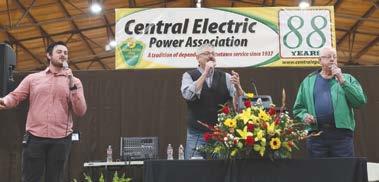




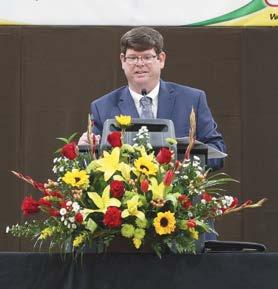













by Scott Flood
When lineworkers are perched in a bucket truck, repairing power lines along a busy road, they have good reason to be concerned about their safety. However, most are less apprehensive about problems like working with high voltages or falling. Their biggest worry is also the most unpredictable: a distracted driver slamming into their vehicle or a nearby power pole.
The National Safety Council reported that 891 people were killed and 37,701 people were injured in work zone crashes during 2022 (the most recent statistics). Most of those crashes occur in construction sites, which are usually well-marked. Electric co-op crews are likely to face even greater danger, as they are often working alone along remote stretches of roads, frequently in heavy rain or other adverse weather conditions that can reduce their visibility.
The danger of work zone crashes led every state to adopt “move over” laws that require drivers to lower their speed and switch lanes when possible to protect emergency vehicles. The goal is to provide an added safety bu er and minimize the potential for accidents. Drivers caught violating the laws can face penalties, such as significant fines.
Compounding this issue is the dramatic increase in distracted driving. The National Transportation Highway Safety Administration has reported that as many as 1,000 Americans are injured each day because of activities that take drivers’ attention away from the road. The most common is reading and responding to text messages. If a driver traveling at 55 miles per hour glances at their phone for just five seconds, they’ll have traveled the length of a football field before returning their gaze to the road.
The design of today’s vehicles contributes to distraction. Many vehicles have complex controls for entertainment and climate that demand the driver take their eyes o the road to make even simple adjustments.
Geography can also be a factor. Co-ops serving rural and remote areas often have power lines along twisty and hilly roads. Locals accustomed to driving those roads at fairly high speeds may be startled and have little time to react when they encounter a work crew past a hill or around a curve.
Besides the potential for lineworker injuries, accidents can also damage or destroy expensive service vehicles, reducing a co-op’s ability to respond to outages and other problems. Power poles and other infrastructure may also su er severe damage.
Additionally, many of the tasks performed by lineworkers, such as reconnecting high-voltage power lines, are inherently dangerous and require their complete focus. When their attention is distracted by speeding or noisy vehicles, they’re more likely to make mistakes that can complicate the repair or cause injury.
Nor are co-op employees at risk only when their vehicles are parked and repairs are underway. Lineworkers frequently have to drive slowly along the shoulder of roads to pinpoint broken power lines or failed
transformers, especially in darkness or conditions that interfere with visibility.
Many state transportation agencies have work zone awareness programs. Amplifying those e orts by devoting part of a co-op’s advertising, publicity, and social media reminds co-op members and other drivers of the importance of giving lineworkers a wide berth.
Co-ops are considering ways they can modify bucket trucks and other service vehicles to make them more visible. Bright colors and additional lighting such as flashing strobe lights and lighted detour arrows can attract attention from a distance. Reflective “work zone ahead” signs can also alert drivers to be ready for an unusual situation. Sometimes, a little bit of extra attention is all that’s needed to prevent a serious incident.
For more than four decades, business writer Scott Flood has worked with electric cooperatives to build knowledge of energy-related issues among directors, sta and members.
Mississippi’s “Move Over” law was passed to safeguard law enforcement, fire, highway construction workers, and utility crews and vehicles.
According to the law, motorists passing a utility vehicle must slow down and yield the right-of-way by changing lanes, keeping at least one empty lane where possible. If a lane change is impossible, a driver must slow down and be prepared to stop.
Violators may be fined up to $250 for failing to comply and up to $1,000 if there is damage to the o cial vehicle or injury to any driver or passenger of an o cial vehicle.

Besides the potential for lineworker injuries, roadside accidents can also damage or destroy expensive service vehicles, reducing a co-op’s ability to respond to outages and other problems.


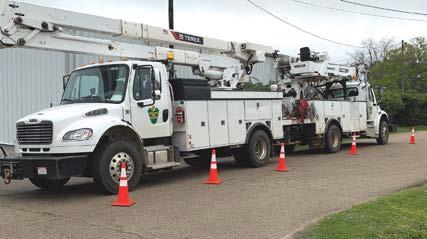










































by Qua’Shara Monix










May is a month of transformation, marking the transition from the freshness of spring to the warmth of summer. The weather is comfortably warm, but not too hot, making it perfect for outdoor adventures. Gardens burst with color, trees are lush and green; birds are more active, filling the air with cheerful songs, while the scent of fresh-cut grass signals that summer is just around the corner.
For many young athletes, May signals the beginning of summer baseball. Little League and youth baseball programs swing into full gear, bringing excitement to fields across neighborhoods. Kids in their uniforms, eager to hit the diamond, improve their skills, and make new friends. Parents cheer from the sidelines, enjoying the return of America’s pastime and the sense of community it brings.
May is a significant month for students, as it is often the time for graduation ceremonies. Whether it’s high school, college, or even kindergarten, graduation represents the culmination of years of hard work and dedication. Families gather to celebrate achievements, and graduates prepare to embark on new journeys, some stepping into the
























workforce and others continuing their education. It’s a time of pride, reflection, and anticipation for what the future holds.
One of the most solemn and meaningful observances in May is Memorial Day, which takes place on the last Monday of the month. This federal holiday honors the brave men and women who have sacrificed their lives while serving in the U.S. military. Many families visit cemeteries to place flags and flowers on the graves of fallen soldiers. Communities hold parades and ceremonies to remember and pay tribute to these heroes. It’s also a time when people gather with loved ones, often marking the uno cial start of summer with barbecues and outdoor gatherings.
Embrace the spirit of May that’s filled with change, celebration, and anticipation. From the beauty of the season to the joy of graduation, from honoring heroes on Memorial Day to the crack of the baseball bat on the field, May o ers something for everyone. As we embrace the warmth and promise of the coming summer, we find ourselves inspired by the sense of renewal and the endless possibilities ahead.












by Scott Flood
When lineworkers are perched in a bucket truck, repairing power lines along a busy road, they have good reason to be concerned about their safety. However, most are less apprehensive about problems like working with high voltages or falling. Their biggest worry is also the most unpredictable: a distracted driver slamming into their vehicle or a nearby power pole.
The National Safety Council reported that 891 people were killed and 37,701 people were injured in work zone crashes during 2022 (the most recent statistics). Most of those crashes occur in construction sites, which are usually well-marked. Electric co-op crews are likely to face even greater danger, as they are often working alone along remote stretches of roads, frequently in heavy rain or other adverse weather conditions that can reduce their visibility.
The danger of work zone crashes led every state to adopt “move over” laws that require drivers to lower their speed and switch lanes when possible to protect emergency vehicles. The goal is to provide an added safety bu er and minimize the potential for accidents. Drivers caught violating the laws can face penalties, such as significant fines.
Additionally, many of the tasks performed by lineworkers, such as reconnecting high-voltage power lines, are inherently dangerous and require their complete focus. When their attention is distracted by speeding or noisy vehicles, they’re more likely to make mistakes that can complicate the repair or cause injury.
Compounding this issue is the dramatic increase in distracted driving. The National Transportation Highway Safety Administration has reported that as many as 1,000 Americans are injured each day because of activities that take drivers’ attention away from the road. The most common is reading and responding to text messages. If a driver traveling at 55 miles per hour glances at their phone for just five seconds, they’ll have traveled the length of a football field before returning their gaze to the road.

Besides the potential for lineworker injuries, roadside accidents can also damage or destroy expensive service vehicles, reducing a co-op’s ability to respond to outages and other problems.




The design of today’s vehicles contributes to distraction. Many vehicles have complex controls for entertainment and climate that demand the driver take their eyes o the road to make even simple adjustments.
Geography can also be a factor. Co-ops serving rural and remote areas often have power lines along twisty and hilly roads. Locals accustomed to driving those roads at fairly high speeds may be startled and have little time to react when they encounter a work crew past a hill or around a curve.
Besides the potential for lineworker injuries, accidents can also damage or destroy expensive service vehicles, reducing a co-op’s ability to respond to outages and other problems. Power poles and other infrastructure may also su er severe damage.
Additionally, many of the tasks performed by lineworkers, such as reconnecting high-voltage power lines, are inherently dangerous and require their complete focus. When their attention is distracted by speeding or noisy vehicles, they’re more likely to make mistakes that can complicate the repair or cause injury.
Nor are co-op employees at risk only when their vehicles are parked and repairs are underway. Lineworkers frequently have to drive slowly along the shoulder of roads to pinpoint broken power lines or failed transformers, especially in darkness or conditions that interfere with visibility.
Many state transportation agencies have work zone awareness programs. Amplifying those e orts by devoting part of a co-op’s advertising, publicity, and social media reminds co-op members and other drivers of the importance of giving lineworkers a wide berth.
Co-ops are considering ways they can modify bucket trucks and other service vehicles to make them more visible. Bright colors and additional lighting such as flashing strobe lights and lighted detour arrows can attract attention from a distance. Reflective “work zone ahead” signs can also alert drivers to be ready for an unusual situation. Sometimes, a little bit of extra attention is all that’s needed to prevent a serious incident.
For more than four decades, business writer Scott Flood has worked with electric cooperatives to build knowledge of energy-related issues among directors, sta and members.

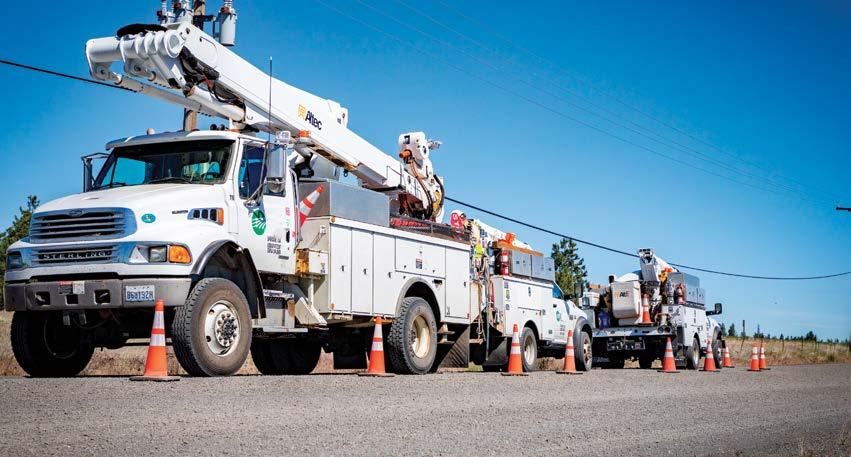




Mississippi’s “Move Over” law was passed to safeguard law enforcement, fire, highway construction workers, and utility crews and vehicles.
According to the law, motorists passing a utility vehicle must slow down and yield the right-of-way by changing lanes, keeping at least one empty lane where possible. If a lane change is impossible, a driver must slow down and be prepared to stop.
Violators may be fined up to $250 for failing to comply and up to $1,000 if there is damage to the o cial vehicle or injury to any driver or passenger of an o cial vehicle.

Co-ops serving rural and remote areas often have power lines along twisty roads. Locals accustomed to driving those roads at fairly high speeds may be startled and have little time to react when they encounter a work crew around a curve.












What does “beat the peak” mean, and why should I care about it?

AElectricity generation and energy supply must match consumption in real time to ensure safe, reliable power. Every moment of every day, an entire workforce monitors energy use, adjusting power plant production up or down as needed to keep the grid balanced.
As energy demand grows, all of us can do our part to use less. To put this in perspective, peak electricity demand is expected to increase by 38 gigawatts over the next four years, according to the Energy Information Administration. That’s like adding another California to our nation’s power grid.

Peak time varies for each electric utility but typically occurs in the morning when people get ready for the day and in the evening when they return home from work and school. During these times, we turn on lights, cook, adjust the thermostat, run the dishwasher, and do laundry — to name just a few energy-consuming activities.
Typically, the price of power increases when demand is higher. Reducing your electric use during peak times can help lower market prices for everyone and lessen stress on the electric grid.
Electric cooperatives set electric rates to cover costs. Some utilities have time-ofuse rates that reflect higher costs during peak demand periods. Whether you have time-of-use rates or not, these tips can help keep costs down for your utility and establish o -peak energy habits.
When your cooperative talks about “beat the peak,” it is a call to action for energy consumers to reduce electricity use during periods of highest demand. Using less energy during peak times can ease the strain on the electric grid, benefit your co-op, and sometimes lower your electric bill.
As a general rule, I try to spread out my use of equipment and appliances. For example, I avoid washing dishes and clothes, and cooking all at the same time. Running a lot of hot water will cause your water heater to use more energy, too.
Increasing the energy e ciency of your home can lower its impact on the grid. Weatherize windows and doors and add insulation to improve the comfort of your home. You can also consider upgrading to energy e cient appliances or using energy-saving features on your existing appliances.
If you haven’t already, switch your incandescent lighting to LEDs, which use at least 75% less electricity and last up to 25 times longer, according to the U.S. Department of Energy. There are many a ordable options on the market.
Schedule your dishwasher run time. My dishwasher, which is several years old, has a “delay start” button. This is also handy if your dishwasher is loud. Setting it to start after you go to bed shifts that energy consumption to o -peak hours, and you don’t have to hear it.

Still haven’t made the switch to LED lighting? You could be using at least 75% less electricity with LED bulbs.
Running your washing machine and dryer during o -peak hours can help, too. If you’re in the market for a new washer or dryer, look for a model with a high Integrated Modified Energy Factor and a low Integrated Water Factor to save water and energy.
Also, consider switching your charging habits for all devices to opeak hours. If you have an electric vehicle, use the scheduled charge settings. You’ll plug in your vehicle when you get home, and it will start charging automatically during the o -peak hours you choose.
Small changes at home can make a big di erence to the energy grid. Incorporate these energy-wise habits into your daily routine.
Miranda Boutelle is the chief operating o cer at E ciency Services Group in Oregon, a cooperatively owned energy e ciency company.































May is Electrical Safety Month. Of course, safety is our priority every day of the year for our employees and members. I encourage all of you to take time this month to read and follow the safety tips found on page 18. The information is valuable and easy to implement in your home. As temperatures heat up, we’ll also be spending more time in and around water, so it’s an ideal time to review pool and boating safety practices. Our safety website, beawareeverywhere.com is a great resource for our members this summer and throughout the year. Reviewing these resources and having a conversation with your family about safety only takes a few minutes and could be a valuable tool to keep your family and your property safe. Have a safe and fun start to your summer!





President and CEO by Ron Barnes
Coast Electric and CoastConnect business o ces will be closed Monday, May 26, for the Memorial Day holiday. We hope everyone takes time over the holiday weekend to remember those who made the ultimate sacrifice for our country. Dispatchers will be on duty, and crews will be on call throughout the holiday weekend in case of an outage.
TO CONTACT COAST ELECTRIC:








Coast Electric wants you to reduce your energy use and see savings on your energy costs. Each month, you will have an opportunity to register to win a prize that will help you reduce the energy consumption in your home. Visit www.coastelectric.coop or scan the QR code to enter. It only takes a few seconds, and you could win a prize that helps you save!
Congratulations to our March Reduce Your Use winner, Terry Stanley.




You can report outages by:
• Texting “Outage” to 228-338-4644 if you have a mobile number associated with your account.
• Using the CE on the Go mobile app.
• Reporting it online: https://outages.coastelectric.coop/
• We CANNOT take outage reports on our social media accounts. Trying to report your outage on social media does put your outage into our system or report it to dispatchers or crews.
You can pay a bill by:
• Texting “Pay” to 352667 if you have a mobile number associated with your account.
• Using the CE on the Go mobile app.




• Visiting a kiosk located at each of our o ces.
• Calling 877-769-2372 to use our automated payment system.
TO CONTACT COASTCONNECT:
For all after-hours inquiries, CoastConnect subscribers can chat with tech support on www.CoastConnect.com or call 877-969-3884 and speak to our 24/7 tech support team.

















Summer is coming, and it’s the perfect season to use the extra daylight hours to grill, play and enjoy the great outdoors. Whether it’s listening to your favorite playlist by the pool or enjoying an outdoor movie night, CoastConnect’s high-speed internet service helps subscribers squeeze every ounce of fun out of the summer months!
Many subscribers have experienced how smart home technology can transform your house into an ideal living space, but the delights of smart home devices don’t have to be limited to the four corners of your house. With some planning and creative design, you can take the conveniences of smart home technology into your backyard!
And with just minor adjustments to your WiFi setup, CoastConnect’s fiber internet can easily reach your back porch, patio and yard, providing internet coverage wherever you wish to enjoy your outdoor home life.













Your smart backyard begins with extending your WiFi range to reach the coverage needed for outdoor living space. WiFi extenders capture your home’s wireless signal and disperse it farther and more broadly, enabling greater coverage. Outdoor range extenders are designed to be resistant to precipitation and dust. Extenders are an essential first step to controlling all the other devices we suggest below and will help ensure a strong signal you can count on for all your outdoor internet needs.
While smart doorbells and cameras have become popular for monitoring your front door and driveway, you can also create additional peace of mind by providing similar security for your backyard.
Outdoor wireless security cameras let you keep an eye on what’s happening in your backyard, which can be especially useful when your kids are playing outside while you’re attending to other matters indoors. Motion sensors can detect unwanted visitors, including wildlife, making a smart outdoor security camera a wise choice.
When you’re entertaining, whether it’s a pool party or an outdoor barbecue, music is a must. With dust-tight, waterproof outdoor smart speakers, you can arrange a sound system for your backyard or patio that rivals your indoor entertainment set-up!
Smart speakers can connect to your devices and music apps like Apple Music or Spotify, letting you show o your playlists. Some outdoor smart speakers can produce what you may need, but consider adding multiple smart speakers and pairing them together for even richer sound.
With today’s technology, you don’t have to sit indoors to enjoy TV. More and more backyard barbecues and parties are incorporating live sports and other entertainment on outdoor smart TVs, which are not limited by the length of the cable cord!
While outdoor smart TVs are more expensive than their indoor counterparts, they are outfitted to endure the elements and last years longer outdoors, too, making them a better long-term value. Look for IP55-rated models, which are the most moisture-resistant and dust-proof (and pollen-proof!) outdoor smart TVs.

Outdoor lighting can add something special to the ambiance of your backyard. Whether you create dramatic e ects by spotlighting shrubbery and trees, or stringing-up lights along pathways, smart lighting takes outdoor lighting to the next level.
Today’s smart lighting tech lets you control and adjust the power of the lighting, including dimming, just with your voice. Other smart bulbs can adjust colors and hues, adding to various lighting e ects.
Smart grills include many features designed to reduce the stress that frequently accompany backyard barbecues. Today’s smart technology is built into your smart grill, keeping you informed on timing and temperature, so you don’t undercook your guests’ hamburgers or burn your shish kabobs to crisps. A smart grill can genuinely help make your next backyard barbecue a success!
By setting up a smart backyard, you might enjoy more of your property than you ever imagined. Together with CoastConnect’s fiber network, these smart devices can integrate modern technology seamlessly across your back porch and patio, making your home more livable, secure and valuable.





























by Abby Berry
Every May, Electrical Safety Month serves as a vital reminder of the importance of preventing electrical hazards at home. Electricity powers nearly every aspect of modern life, but if handled improperly, it can pose serious risks, including injuries and property damage.

Your electric cooperative understands the risks associated with improper electricity use, which is why we’re committed to reminding you to stay vigilant and practice electrical safety not only in May, but year-round.
By following key safety practices, you can reduce the risk of electrical hazards and ensure your family stays protected.












Here are five essential tips for powering up safely at home
1. BE VIGILANT Regularly inspect your home’s electrical system for any signs of damage or outdated components and replace any frayed electrical wires or cords. The Electrical Safety Foundation International estimates roughly 3,300 home fires originate from extension cords every year, either from overloading, overheating, or fraying. If you’re relying on extension cords as permanent power solutions, consider contacting a qualified electrician to install additional outlets where you need them.
2. USE SURGE PROTECTORS Safeguard your sensitive electronics and appliances from surges with surge protectors. These handy devices help divert excess voltage away from your electronics, reducing the risk of damage or electrical fires. Not all power strips include surge protection, so read the product label carefully. Additionally, surge protectors can lose e ectiveness over time and should be replaced when damaged or outdated.
3. PRACTICE SAFE POWER STRIP USE Avoid overloading electrical outlets with power strips that exceed the outlet’s capacity. High-energy devices, like heaters, microwaves, and hairdryers should be distributed across multiple outlets. Overloading an outlet with a “busy” power strip can lead to overheating and create a fire hazard, so be sure to check the power strip’s wattage rating before plugging in items.











4. WATER AND ELECTRICITY DON’T MIX It may seem obvious, but accidents involving water contact with electrical items happen. Always keep electrical appliances and devices away from water sources, like sinks, bathtubs, or swimming pools. Make sure your hands are dry before touching any electrical switches or appliances — never handle electrical devices with wet hands. Ground Fault Circuit Interrupters (GFCIs) should be installed in areas where water and electricity are typically in close proximity, including kitchens, bathrooms, and outdoor outlets.
5. EDUCATE FAMILY MEMBERS
One of the best ways to ensure the safety of everyone in your household is to talk about electrical safety. Teach children not to play with electrical outlets or appliances and ensure they understand the potential dangers of electricity. Create and practice a home fire escape plan that includes electrical safety precautions in case of emergencies.
Practicing electrical safety at home is essential for protecting your family, property, and peace of mind. Remember, electrical safety isn’t just a one-time e ort — it’s a year-round responsibility. Taking these steps can help ensure a safer, more secure home for you and your loved ones.
Abby Berry writes on consumer and cooperative a airs for the National Rural Electric Cooperative Association.
Friday, May 2 • 9 a.m.-1 p.m.
































by Abby Berry


















Every May, Electrical Safety Month serves as a vital reminder of the importance of preventing electrical hazards at home. Electricity powers nearly every aspect of modern life, but if handled improperly, it can pose serious risks, including injuries and property damage.

Your electric cooperative understands the risks associated with improper electricity use, which is why we’re committed to reminding you to stay vigilant and practice electrical safety not only in May, but year-round. By following key safety practices, you can reduce the risk of electrical hazards and ensure your family stays protected.





1. BE VIGILANT Regularly inspect your home’s electrical system for any signs of damage or outdated components and replace any frayed electrical wires or cords. The Electrical Safety Foundation International estimates roughly 3,300 home fires originate from extension cords every year, either from overloading, overheating, or fraying. If you’re relying on extension cords as permanent power solutions, consider contacting a qualified electrician to install additional outlets where you need them.
2. USE SURGE PROTECTORS Safeguard your sensitive electronics and appliances from surges with surge protectors. These handy devices help divert excess voltage away from your electronics, reducing the risk of damage or electrical fires. Not all power strips include surge protection, so read the product label carefully. Additionally, surge protectors can lose e ectiveness over time and should be replaced when damaged or outdated.
3. PRACTICE SAFE POWER STRIP USE Avoid overloading electrical outlets with power strips that exceed the outlet’s capacity. High-energy devices, like heaters, microwaves, and hairdryers should be distributed across multiple outlets. Overloading an outlet with a “busy” power strip can lead to overheating and create a fire hazard, so be sure to check the power strip’s wattage rating before plugging in items.
5. EDUCATE FAMILY MEMBERS









4. WATER AND ELECTRICITY DON’T MIX It may seem obvious, but accidents involving water contact with electrical items happen. Always keep electrical appliances and devices away from water sources, like sinks, bathtubs, or swimming pools. Make sure your hands are dry before touching any electrical switches or appliances — never handle electrical devices with wet hands. Ground Fault Circuit Interrupters (GFCIs) should be installed in areas where water and electricity are typically in close proximity, including kitchens, bathrooms, and outdoor outlets.
One of the best ways to ensure the safety of everyone in your household is to talk about electrical safety. Teach children not to play with electrical outlets or appliances and ensure they understand the potential dangers of electricity. Create and practice a home fire escape plan that includes electrical safety precautions in case of emergencies.
Practicing electrical safety at home is essential for protecting your family, property, and peace of mind. Remember, electrical safety isn’t just a one-time e ort — it’s a year-round responsibility. Taking these steps can help ensure a safer, more secure home for you and your loved ones.
Abby Berry writes on consumer and cooperative a airs for the National Rural Electric Cooperative Association.




















by Scott Flood
When lineworkers are perched in a bucket truck, repairing power lines along a busy road, they have good reason to be concerned about their safety. However, most are less apprehensive about problems like working with high voltages or falling. Their biggest worry is also the most unpredictable: a distracted driver slamming into their vehicle or a nearby power pole.
The National Safety Council reported that 891 people were killed and 37,701 people were injured in work zone crashes during 2022 (the most recent statistics). Most of those crashes occur in construction sites, which are usually well-marked. Electric co-op crews are likely to face even greater danger, as they are often working alone along remote stretches of roads, frequently in heavy rain or other adverse weather conditions that can reduce their visibility.
The danger of work zone crashes led every state to adopt “move over” laws that require drivers to lower their speed and switch lanes when possible to protect emergency vehicles. The goal is to provide an added safety bu er and minimize the potential for accidents. Drivers caught violating the laws can face penalties, such as significant fines.
Additionally, many of the tasks performed by lineworkers, such as reconnecting high-voltage power lines, are inherently dangerous and require their complete focus. When their attention is distracted by speeding or noisy vehicles, they’re more likely to make mistakes that can complicate the repair or cause injury.
Compounding this issue is the dramatic increase in distracted driving. The National Transportation Highway Safety Administration has reported that as many as 1,000 Americans are injured each day because of activities that take drivers’ attention away from the road. The most common is reading and responding to text messages. If a driver traveling at 55 miles per hour glances at their phone for just five seconds, they’ll have traveled the length of a football field before returning their gaze to the road.

Besides the potential for lineworker injuries, roadside accidents can also damage or destroy expensive service vehicles, reducing a co-op’s ability to respond to outages and other problems.




The design of today’s vehicles contributes to distraction. Many vehicles have complex controls for entertainment and climate that demand the driver take their eyes o the road to make even simple adjustments.
Geography can also be a factor. Co-ops serving rural and remote areas often have power lines along twisty and hilly roads. Locals accustomed to driving those roads at fairly high speeds may be startled and have little time to react when they encounter a work crew past a hill or around a curve.
Besides the potential for lineworker injuries, accidents can also damage or destroy expensive service vehicles, reducing a co-op’s ability to respond to outages and other problems. Power poles and other infrastructure may also su er severe damage.
Additionally, many of the tasks performed by lineworkers, such as reconnecting high-voltage power lines, are inherently dangerous and require their complete focus. When their attention is distracted by speeding or noisy vehicles, they’re more likely to make mistakes that can complicate the repair or cause injury.
Nor are co-op employees at risk only when their vehicles are parked and repairs are underway. Lineworkers frequently have to drive slowly along the shoulder of roads to pinpoint broken power lines or failed transformers, especially in darkness or conditions that interfere with visibility.
Many state transportation agencies have work zone awareness programs. Amplifying those e orts by devoting part of a co-op’s advertising, publicity, and social media reminds co-op members and other drivers of the importance of giving lineworkers a wide berth.
Co-ops are considering ways they can modify bucket trucks and other service vehicles to make them more visible. Bright colors and additional lighting such as flashing strobe lights and lighted detour arrows can attract attention from a distance. Reflective “work zone ahead” signs can also alert drivers to be ready for an unusual situation. Sometimes, a little bit of extra attention is all that’s needed to prevent a serious incident.
For more than four decades, business writer Scott Flood has worked with electric cooperatives to build knowledge of energy-related issues among directors, sta and members.






Mississippi’s “Move Over” law was passed to safeguard law enforcement, fire, highway construction workers, and utility crews and vehicles.
According to the law, motorists passing a utility vehicle must slow down and yield the right-of-way by changing lanes, keeping at least one empty lane where possible. If a lane change is impossible, a driver must slow down and be prepared to stop.
Violators may be fined up to $250 for failing to comply and up to $1,000 if there is damage to the o cial vehicle or injury to any driver or passenger of an o cial vehicle.

Co-ops serving rural and remote areas often have power lines along twisty roads. Locals accustomed to driving those roads at fairly high speeds may be startled and have little time to react when they encounter a work crew around a curve.












What does “beat the peak” mean, and why should I care about it?

AElectricity generation and energy supply must match consumption in real time to ensure safe, reliable power. Every moment of every day, an entire workforce monitors energy use, adjusting power plant production up or down as needed to keep the grid balanced.
As energy demand grows, all of us can do our part to use less. To put this in perspective, peak electricity demand is expected to increase by 38 gigawatts over the next four years, according to the Energy Information Administration. That’s like adding another California to our nation’s power grid.

Peak time varies for each electric utility but typically occurs in the morning when people get ready for the day and in the evening when they return home from work and school. During these times, we turn on lights, cook, adjust the thermostat, run the dishwasher, and do laundry — to name just a few energy-consuming activities.
Typically, the price of power increases when demand is higher. Reducing your electric use during peak times can help lower market prices for everyone and lessen stress on the electric grid.
Electric cooperatives set electric rates to cover costs. Some utilities have time-ofuse rates that reflect higher costs during peak demand periods. Whether you have time-of-use rates or not, these tips can help keep costs down for your utility and establish o -peak energy habits.
When your cooperative talks about “beat the peak,” it is a call to action for energy consumers to reduce electricity use during periods of highest demand. Using less energy during peak times can ease the strain on the electric grid, benefit your co-op, and sometimes lower your electric bill.
As a general rule, I try to spread out my use of equipment and appliances. For example, I avoid washing dishes and clothes, and cooking all at the same time. Running a lot of hot water will cause your water heater to use more energy, too.
Increasing the energy e ciency of your home can lower its impact on the grid. Weatherize windows and doors and add insulation to improve the comfort of your home. You can also consider upgrading to energy e cient appliances or using energy-saving features on your existing appliances.
If you haven’t already, switch your incandescent lighting to LEDs, which use at least 75% less electricity and last up to 25 times longer, according to the U.S. Department of Energy. There are many a ordable options on the market.
Schedule your dishwasher run time. My dishwasher, which is several years old, has a “delay start” button. This is also handy if your dishwasher is loud. Setting it to start after you go to bed shifts that energy consumption to o -peak hours, and you don’t have to hear it.

Still haven’t made the switch to LED lighting? You could be using at least 75% less electricity with LED bulbs.
Running your washing machine and dryer during o -peak hours can help, too. If you’re in the market for a new washer or dryer, look for a model with a high Integrated Modified Energy Factor and a low Integrated Water Factor to save water and energy.
Also, consider switching your charging habits for all devices to opeak hours. If you have an electric vehicle, use the scheduled charge settings. You’ll plug in your vehicle when you get home, and it will start charging automatically during the o -peak hours you choose.
Small changes at home can make a big di erence to the energy grid. Incorporate these energy-wise habits into your daily routine.
Miranda Boutelle is the chief operating o cer at E ciency Services Group in Oregon, a cooperatively owned energy e ciency company.


























I know it seems that I recycle messaging sometimes, but I want to be sure that I’m providing useful and relevant information that you can use to either save money or protect yourself, or sometimes both. That said, at Dixie Electric, we take great pride in serving our members with integrity, reliability, and transparency. Unfortunately, as technology advances, so do the tactics of scammers looking to exploit unsuspecting individuals. For the last several years, utility scams have been on the rise, and it’s more important than ever to stay mindful. By recognizing the warning signs and taking a few precautionary steps, you can protect yourself and your family from falling victim to these fraudulent schemes.
Scammers often pose as representatives from a utility company, using phone calls, emails, or even in-person visits to deceive members. Their goal is simple: to create a sense of urgency that pressures you into making a hasty decision. They may claim that your power will be disconnected within minutes if you don’t make an immediate payment. Others may try to trick you into providing personal or financial information under the guise of a billing issue or an equipment upgrade.
Another red flag is the payment method scammers demand. Scammers frequently insist on unconventional payment options such as prepaid debit cards, gift cards, wire transfers, or mobile payment apps. These methods make it nearly impossible to trace the funds or recover lost money once the transaction is complete. Some scammers are bold enough to ask for your banking or debit card information directly. Providing these details can give them direct access to your funds. If anyone unexpectedly requests this sensitive information, treat it as a significant warning sign and refuse to share your details.
If you suspect a utility scam, the best course of action is to slow down and verify before taking any action. Scammers rely on urgency to catch you o guard, so don’t let them rush you into a decision. Instead, follow these simple steps to ensure you’re dealing with a legitimate request:

Verify the communication – If you receive a call, email, or visit from someone claiming to be from Dixie Electric, take a moment to confirm their identity. Do not use the phone number provided by the caller or in the email. Instead, refer to your monthly bill or visit our o cial website to find our verified contact number. Scammers can even spoof our phone number to make it appear as though the call is coming from us. If you receive a suspicious call, hang up immediately and dial our verified number directly.
Avoid immediate payments – Dixie Electric will never demand instant payment or threaten immediate disconnection. If someone is pressuring you to pay right away, it’s a strong indication of a scam. Hang up and contact us to review your membership account.
Be cautious with personal information – Never provide your account details, Social Security number, or banking information to someone who contacts you unexpectedly. Legitimate utility representatives will not ask for this information in an unsolicited call or email.
Stay informed and Spread Awareness – Scammers constantly change their tactics, so staying informed about the latest fraud attempts is crucial. Follow Dixie Electric on social media and visit our website for updates on common scams and ways to protect yourself. If you encounter a potential scam, report it to us and warn your friends, family, and neighbors — especially those who may be more vulnerable. Awareness is one of the best defenses against fraud.
At Dixie Electric, we are committed to protecting our members and providing safe, reliable service. If you ever receive a suspicious communication regarding your account, call us directly at 601-425-2535 to confirm its legitimacy. By taking a moment to verify before acting, you can prevent scammers from succeeding and keep your personal and financial information secure.









by Randy Smith
General Manager

Our business o ces will be closed Monday, May 26, in observance of Memorial Day. Dixie Electric personnel will be on call throughout the holiday weekend. Call 601-425-2535 to report a power outage.















16th annual charity golf tournament raises $18,825 to fight food insecurity
by Amanda Mills
Under clear blue skies and perfect spring weather, 42 teams teed o at the Laurel Country Club on March 27, for our 16th annual charity golf tournament. This year’s event was nothing short of spectacular, bringing together local businesses, community partners, and golf enthusiasts for a great cause.
The four-man scramble, split into two flights, was not just about competition—it was about making a di erence. Thanks to the overwhelming support of our players, hole sponsors, and generous donors, we raised an incredible $18,825. This marks our most successful tournament to date, surpassing last year’s record-setting total by nearly $3,000!
Each of the four benefiting charities will receive a $4,710 donation:
• The Glory House in Laurel, which operates a food pantry to provide meals to families in need.
• Junior Auxiliary of Laurel, Junior Auxiliary of Wayne County, and Calvary Baptist Church of Petal, which all support secret meal programs that provide nonperishable food items to children experiencing food insecurity at night and on weekends.
At the heart of our organization is the cooperative principle of Concern for Community, and what better way to demonstrate that than by helping to feed families, especially children, right here in our area?
We extend our deepest gratitude to everyone who contributed — whether by playing, sponsoring a hole, or donating a door prize. Your support is what makes this tournament such a resounding success year after year. We look forward to continuing this tradition and making an even greater impact in the years to come!






























A-1 Tire
AC Farms
Adtran
AECI Utility Solutions
Aertker Company
Altec Inc.
American Graphx
Anderson Design Center
B & R Industrial Supply
Global Rigging and Synthetics
GraybaR
Gresco
Harris Dental Clinic
Headrick Compainies
Hercules Wire Rope & Sling Co., Inc.
HoJo Pro Realty
Holt Accounting

Bakelite
Beth Johnson Advertising

B-Line
Boot Country, LLC
Border States
Border States Utility
Brady Industries
Burroughs Diesel Inc.
Cadence Bank
Calix
Caves & Caves
CFC
Chain Electric Company
Chancellor, Inc.
Coast to Coast Installations LLC
CoBank
Coca-Cola
Community Bank
Cooperative Energy Cornerstone Group
CRC
Dallas Printing
DE Fastlink
Desoto Treated Materials, Inc.
Ditchwitch
Dixie GIS
Dunn Roadbuilders
Electric Cooperatives of Mississippi
First State Bank
Futura
Garner Lumley Electric










Hortman Harlow
Howard Industries
Howard Technology Solutions
Industrial Service of Laurel, Inc.
Irby Utility
Jones Workforce College
JT Thorpe/Cooperative Energy
Kelley Brothers
LogicomUSA
MDR
NISC
NRTC
Osmose
Pine Belt Air Quality Services
Powerful Web
Quality Welding Machine & Hydraulics, LLC
Riggs Tree Service
Rustin Waste Service
RYCO Rental Services LLC
SDT
Shook/Hinnant/Hinnant
Signs First
Southern 4 Wheel Drive & Marine
Southern Pine Electric
Southern Tire Mart
Survey & Ballot Systems
T. Thornsberry Services
Todd Allred
Voxo
Walters Construction Co., Inc.
WESCO




by Amanda Mills
A simple teddy bear can o er more than just comfort—it can provide a sense of security in a child’s most vulnerable moments. Thanks to the generosity of our community, nearly 600 teddy bears were donated through our recent drive to benefit Cherished Hearts, a nonprofit organization that provides forensic interviews for children who are victims of abuse.
These teddy bears will be given to children as they undergo interviews, o ering them a small source of reassurance during an incredibly di cult time. For many, holding onto a soft, comforting bear can make a world of di erence in helping them feel safe and supported as they share their stories.
We are incredibly grateful to everyone who donated to this cause. Your kindness ensures that children facing unimaginable circumstances receive not only the care and advocacy they need but also a reminder that they are not alone.
Thank you for making a di erence in these children’s lives—one teddy bear at a time














Candidates seeking election to represent Districts 1 and 5 on the board of directors for Dixie Electric must visit Dixie Electric’s headquarters o ce at 1863 Highway 184, Laurel, and obtain a Director Qualification Packet during normal business hours between June 1 and July 31. Please contact Mitzi Walley at 601-425-2535 or dixieelectric@dixieepa.com to set up a time. The forms and petitions in the packet must be completed and returned by close of business on Thursday, July 31, 2025.










by Caroline Sellers
Creativity was in full swing as Dixie Electric hosted its fourth annual Student Art Contest, inviting 7th-12th grade students from across its service territory to showcase their artistic talents. This year’s contest featured thought-provoking themes, including The Power of Community, Energy for the Future, Life Powered by Electricity, Safety First, and Lineman— The Unsung Hero.
Thirteen students from the seven counties served by Dixie Electric submitted their artwork, each bringing their own unique perspective to the competition. The entries were judged by a professional graphic artist with an art background from the statewide association for electric cooperatives in Ridgeland.
Rising above the competition was 15-year-old homeschool student Annabelle Beech from the Tucker’s Crossing community in Ellisville. Her acrylic palette knife painting earned her the top prize.
“I was thrilled when I heard I won,” Annabelle shared. “I have learned so much through this experience, and I am so excited to continue learning.”
Annabelle’s love for art started at age 12, inspired by her granny. She now takes lessons from Sherry Taylor and finds inspiration in the works of Van Gogh, often emulating his signature style. When she’s not capturing bold strokes on canvas, she enjoys drawing dogs — especially her beloved Jack Russell, who appears in nearly half of her artwork.
But Annabelle’s talents extend far beyond the art studio. She’s also an accomplished athlete, playing basketball for the Laurel Knighthawks, who recently secured their conference championship. In her free time, she loves playing the piano and teaching her dog new tricks.
As for her future, Annabelle plans to keep art as something fun to do in her personal time rather than a profession. “I don’t think I would enjoy it as a job,” she admitted. “So, I think I will keep it as a hobby.”
Annabelle received a $350 cash prize, and her artwork will be displayed in the Dixie Electric Laurel lobby for one year. With her passion and talent, there’s no doubt Annabelle will continue to leave her artistic mark — both on canvas and beyond.























For 12 years, EMEPA employees have dedicated time and e ort to supporting the fight against cancer through our annual Shoot for a Cure event. This e ort is about more than just fundraising — it’s about standing with families a ected by cancer and contributing to life-saving research.
Cancer touches people of all ages, and its impact on families is profound. As a cooperative rooted in community, we are committed to doing our part to support those battling this disease. Shoot for a Cure brings together employees, vendors, and community members in a friendly sporting clay competition, all with the shared goal of making a di erence.
This year’s event was our biggest yet, with more than 220 shooters participating over two days at Camp Binachi. Thanks to the generosity of our sponsors and participants, we raised $38,000 for St. Jude Children’s Research Hospital and Anderson’s Cancer Patient Benevolence Fund — bringing our 12-year fundraising total to over a quarter of a million dollars.




































If you missed us this year, we hope to see you next spring. Every shot fired is a step toward a future without cancer, and together, we are making an impact.
Together, we can continue to support cancer research, provide assistance to families in need, and fight for a future free from cancer. Thank you for your unwavering support — your involvement truly makes a di erence.
Let’s keep shooting for a cure!





by Randy Carroll






EMEPA o ces will be closed Monday, May 26 in observance of Memorial Day.
Dispatchers and crews will remain on call and ready to respond to any outage or emergency.






Account information and outage reporting is available 24/7 on our app or at EMEPA.com.







East Mississippi Electric Power Association employees and supporters gathered at Camp Binachi in Lauderdale County in April, uniting for a powerful cause — fighting cancer. Their e orts paid o in a big way, raising a record-breaking $38,000 to support cancer research and provide aid to patients in need.
The 12th Annual Shoot for a Cure clay-shooting event generated necessary funds for Anderson Cancer Center’s Cancer Patient Benevolence Fund and St. Jude Children’s Research Hospital, making a meaningful impact on both local and national levels.
“Through Shoot for a Cure, we not only support vital research to find a cure for cancer, but we also provide direct assistance to patients right here in our communities,” said Margaret Brewer, EMEPA’s executive assistant and event coordinator.
EMEPA extends a heartfelt thank you to all sponsors and participants who made this year’s event a resounding success. Your support is changing lives and bringing hope to those in the fight against cancer.















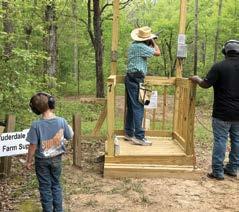














































by Abby Berry











Every May, Electrical Safety Month serves as a vital reminder of the importance of preventing electrical hazards at home. Electricity powers nearly every aspect of modern life, but if handled improperly, it can pose serious risks, including injuries and property damage.
Your electric cooperative understands the risks associated with improper electricity use, which is why we’re committed to reminding you to stay vigilant and practice electrical safety not only in May, but year-round.
By following key safety practices, you can reduce the risk of electrical hazards and ensure your family stays protected.














Here are five essential tips for powering up safely at home
1. BE VIGILANT Regularly inspect your home’s electrical system for any signs of damage or outdated components and replace any frayed electrical wires or cords. The Electrical Safety Foundation International estimates roughly 3,300 home fires originate from extension cords every year, either from overloading, overheating, or fraying. If you’re relying on extension cords as permanent power solutions, consider contacting a qualified electrician to install additional outlets where you need them.
2. USE SURGE PROTECTORS Safeguard your sensitive electronics and appliances from surges with surge protectors. These handy devices help divert excess voltage away from your electronics, reducing the risk of damage or electrical fires. Not all power strips include surge protection, so read the product label carefully. Additionally, surge protectors can lose e ectiveness over time and should be replaced when damaged or outdated.
3. PRACTICE SAFE POWER STRIP USE Avoid overloading electrical outlets with power strips that exceed the outlet’s capacity. High-energy devices, like heaters, microwaves, and hairdryers should be distributed across multiple outlets. Overloading an outlet with a “busy” power strip can lead to overheating and create a fire hazard, so be sure to check the power strip’s wattage rating before plugging in items.











4. WATER AND ELECTRICITY DON’T MIX It may seem obvious, but accidents involving water contact with electrical items happen. Always keep electrical appliances and devices away from water sources, like sinks, bathtubs, or swimming pools. Make sure your hands are dry before touching any electrical switches or appliances — never handle electrical devices with wet hands. Ground Fault Circuit Interrupters (GFCIs) should be installed in areas where water and electricity are typically in close proximity, including kitchens, bathrooms, and outdoor outlets.
5. EDUCATE FAMILY MEMBERS One of the best ways to ensure the safety of everyone in your household is to talk about electrical safety. Teach children not to play with electrical outlets or appliances and ensure they understand the potential dangers of electricity. Create and practice a home fire escape plan that includes electrical safety precautions in case of emergencies.
Practicing electrical safety at home is essential for protecting your family, property, and peace of mind. Remember, electrical safety isn’t just a one-time e ort — it’s a year-round responsibility. Taking these steps can help ensure a safer, more secure home for you and your loved ones.
Abby Berry writes on consumer and cooperative a airs for the National Rural Electric Cooperative Association.




Discover how East Mississippi Connect’s lightning-fast, high-speed internet can lower your energy bills while powering smarter homes. As energy costs rise, consumers are seeking innovative ways to save. One of the most e ective yet often overlooked solutions is East Mississippi Connect internet. With its ability to provide faster speeds and more reliable connections, EMC internet doesn’t just enhance your online experience—it can also lead to significant energy savings for your home or business. Here’s how EMC internet supports energy e ciency and why it’s a smart investment for your future.
A smart home relies on the seamless connection of devices like thermostats, lighting and security systems. These devices need a stable, high-speed internet connection to function optimally. EMC o ers the fastest and most reliable connection, ensuring devices like smart thermostats and energy-e cient lighting work e ectively to manage energy use.
With EMC’s low latency, smart devices can adjust energy use more e ciently. For example, a smart thermostat connected to EMC internet can learn your habits, adjusting heating and cooling based on your schedule, ensuring your HVAC system doesn’t waste energy when it’s not needed. Similarly, smart lighting systems can adjust based on room occupancy or natural light levels, reducing electricity waste.


















Today’s energy-e cient appliances rely on the power of the internet for updates, diagnostics and energysaving features. Refrigerators, dishwashers and washing machines equipped with smart capabilities benefit from EMC’s reliability. With its bandwidth, these devices communicate in real time, ensuring peak e ciency and alerting homeowners when maintenance or energysaving optimizations are needed.
EMC powers home energy management systems that aggregate data from multiple devices to provide insights into consumption patterns. With this information, homeowners can make adjustments and see immediate e ects on their energy bills.






































Beyond convenience, EMC internet can directly impact your energy expenses. Because it facilitates smarter device management and more e cient appliances, you may notice a reduction in electricity costs. Devices run more e ciently, and the ability to control them remotely through apps or voice commands reduces unnecessary energy consumption.





For example, a smart home energy system powered by EMC internet can automatically optimize your home’s energy use, balancing heating, cooling and lighting based on occupancy and time of day—saving you money every month.
Visit EastMSConnect.com today to learn more about how EMC internet can benefit you!









As more households and businesses adopt smart technologies, EMC will play an increasingly critical role in energy e ciency. With its speed and reliability, EMC internet enables devices to communicate in real time, ensuring that energy use is constantly optimized.
Choosing EMC internet is an investment in both convenience and sustainability. Whether it’s controlling your thermostat remotely, adjusting your lighting based on occupancy or keeping your appliances running smoothly, EMC internet helps you make the most of your energy and your budget.
By upgrading to EMC internet, you’re not just getting faster internet—you’re also creating a more energye cient home that can save you money in the long run. With the world moving toward smart, sustainable living, EMC internet is the backbone of energy-saving technology.
Did you know?
Homes with fiber internet can reduce energy costs by up to 10% with smarter, more e cient appliances and systems.


































Magnolia Electric Power (MEP) members gathered on March 27 in the company’s auditorium at the headquarters in Summit, where three incumbent directors were re-elected to their posts.
During the business meeting, Jerry Sisco, Carl Fuller, and Odell McKenzie were re-elected to three-year terms on the board of directors. This election was directed by board attorney, Reggie Jones.
The 2025 Annual Meeting proxies, which were returned first to White and Associates LLP, an independent Certified Public Accounting (CPA) firm, were counted and certified by the firm before being turned over to the MEP Elections and Credential Committee.
The Elections and Credential Committee, comprised of one appointed MEP member for the six districts not up for election, met on March 24 and validated the proxies for the board elections.
As part of the business meeting, Auditor Mark Biggs informed those in attendance that MEP remains in sound financial condition.
MEP General Manager Darrell Smith gave an Annual Meeting report, too. Manager of Member Services and Communications Lucy Shell gave a brief review of the Cooperative Youth Leaders program.
President Dennis Wilson and Assistant Secretary Odell McKenzie also conducted a portion of the business meeting.
Before the Annual Meeting was dismissed, winners’ names for door prizes were drawn for those in attendance.
The winners in attendance included Roger Moak, who won $500 in a credit for electricity. Those receiving a $50 credit on their electric bill are Glenn Callies, Marlin Mullins, Vernon Alford, Mack Frazier, and Dudley Boudreaux.
Prior to the meeting, winners from those who sent in proxies were drawn. The proxy winners, who have been notified by mail, include Amy E. Coon, who won $500 in a credit for electricity. Those receiving a $50 credit on their electric bill are: Kenneth L. Gordon, Donny Cupit, Paul Gatlin, Jimmy Gatlin, and Charles L. Dunaway.
MEP is an electric cooperative and holds an Annual Meeting for its members. Members participate by either returning their proxy or attending the meeting.
















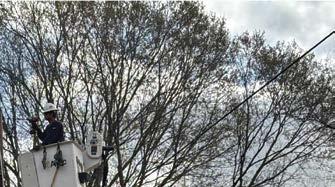
















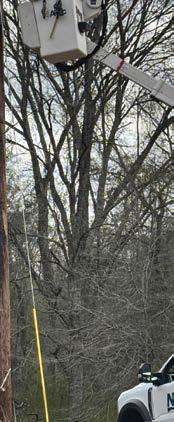

A severe storm that spawned two back-to-back tornadoes passed through the Magnolia Electric service area March 15 and left the cooperative with almost 9,000 outages.
The storm left a track of devastation from the tornadoes, high winds, and rain. The National Weather Service in Jackson declared two tornadoes passed through Walthall County.
The severity of the storm shows in the number of Magnolia’s broken poles — a reported 380 broken poles from the storm.
MEP crews immediately began responding to the outages as soon as it was safe. During initial assessments, the engineers leading the restoration e orts quickly found that MEP would need to bring in help.
Southwest Electric, North East EPA, and East Mississippi EPA were the first electric cooperatives to respond. Singing River Electric joined restoration e orts on the second day.
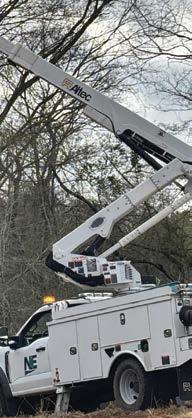

With the combination of MEP linemen, additional electric cooperative crews, electric contractors from Pike, MDR, and Kinco; along with Right-of-Way (ROW) crews from Barnes ROW, Scott Johnson Specialty Service, Magnolia Utility Services, and Asplundh Tree Service, the service area had 285 men in the field helping to get power restored to the meters that could take power.

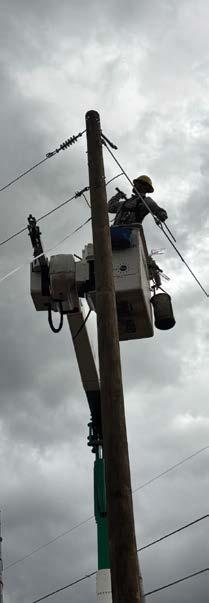

The MEP linemen found a number of trees outside the ROW areas, which had fallen onto power lines due to the high winds. MEP has maintained an aggressive ROW program through the years; however, the cooperative cannot stop a tree from outside the ROW limits if it falls on the lines and causes an outage.
There were also many power poles that had been snapped in half or that had completely knocked to the ground due to weather.
Outages occurred across the MEP system, but the hardest area hit was the Salem community in north Walthall County.
Both tornadoes that touched down were on very similar paths but just a few miles apart. One started in Walthall County and traveled into Marion County. The second one started in the Progress community of Pike County and then traveled to Walthall County.
According to news reports, one was classified as an E-F4 with winds of 170 miles per hour, and the second one an E-F3 with winds of 140 miles per hour.
The MEP storm team worked long hours on power restoration e orts as they do when any kind of storm comes through our service area.
It would be at 10 a.m. on Day 7 — March 21 — that MEP would have all the meters that could take power reenergized.

We want to thank all our members for their patience during this weather event.


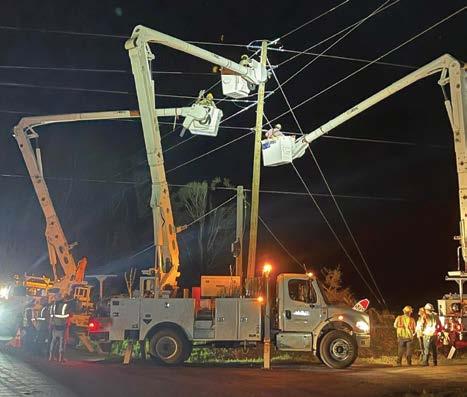
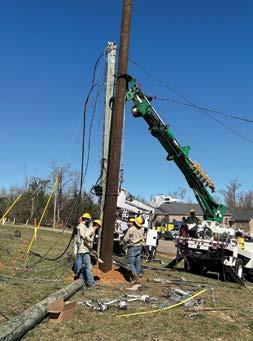
In a March 20, 2025, news article, the Mississippi Emergency Management Agency reported the following information. We have condensed the statewide listing to Pike and Walthall counties, which were the most a ected counties in our service territory.
The Mississippi Emergency Management Agency (MEMA), along with state and local o cials, hundreds of volunteers, faith-based organizations, and private sector partners, is actively responding to the severe weather that struck the state on March 14 and 15, resulting in the loss of seven lives and injuries to dozens more.

MEMA teams are in the process of validating damage reports as counties conduct ongoing assessments.
To date, the agency has recorded damage to 941 homes, 38 businesses, and 25 farms across the state. Of the homes a ected, 164 were destroyed, while 204 sustained major damage.
These figures are subject to change as further evaluations are conducted. MEMA has filled requests for 1,000 sandbags, 1,300 tarps, and more than 24,000 bottles of water for counties.
The National Weather Service has confirmed that 18 tornadoes touched down on March 14 and 15 in Mississippi, including one EF-4, one EF-3, seven EF-2, seven EF-1, and two EF-0 tornadoes.
The following counties have submitted o cial damage reports to the Mississippi Emergency Management Agency. Damages reported range from a ected to destroyed. These numbers can change through the assessment process.
Pike ................ 25 homes
Walthall 182 homes, 6 farms, 4 deaths

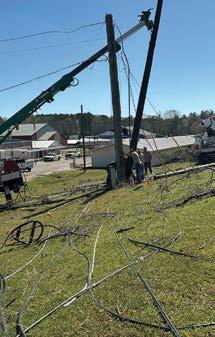
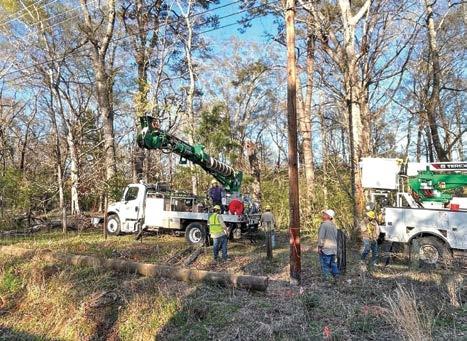


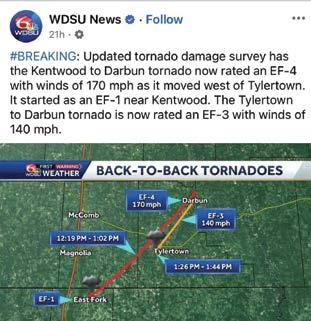














We want to give a special Thank You to all those who helped us during the March 15, 2025, tornadoes.



Asplundh Tree Service
Barnes ROW
Baymont
Bradley Reed (Skidder)
Broma’s Deli
Chick-fil-A
Comfort Inn
Cypress Landing
East Mississippi Electric Power
Hampton Inn and Suites
Jones Companies (provided meals)
Magnolia Utility Service
May’s Café
Market Max

Nona Lynn’s Kitchen
Mississippi Highway Patrol

McAlister’s Deli
MDR
North East Electric Power
Papa John’s
Pike Co Sheri ’s O ce
Quality Inn
Ruth General Store
Scott Johnson Specialty Service
Singing River Electric Power
Southwest Electric Power
Sweet Briar BBQ and Catering
The Crooked Letter Kitchen
The Laundry Room
The Mercy Chef
Tyronne Holmes (Skidder)
Walthall Co Sheri ’s O ce

Vine’s


...and to all of our members!


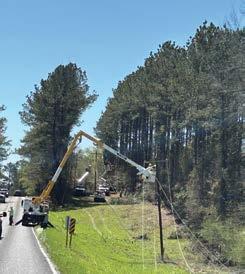



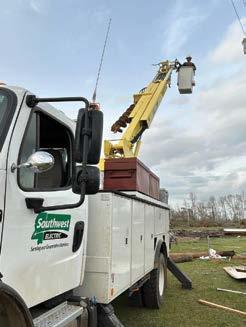














































by Abby Berry






Every May, Electrical Safety Month serves as a vital reminder of the importance of preventing electrical hazards at home. Electricity powers nearly every aspect of modern life, but if handled improperly, it can pose serious risks, including injuries and property damage.
Your electric cooperative understands the risks associated with improper electricity use, which is why we’re committed to reminding you to stay vigilant and practice electrical safety not only in May, but year-round.
By following key safety practices, you can reduce the risk of electrical hazards and ensure your family stays protected.














Here are five essential tips for powering up safely at home
1. BE VIGILANT Regularly inspect your home’s electrical system for any signs of damage or outdated components and replace any frayed electrical wires or cords. The Electrical Safety Foundation International estimates roughly 3,300 home fires originate from extension cords every year, either from overloading, overheating, or fraying. If you’re relying on extension cords as permanent power solutions, consider contacting a qualified electrician to install additional outlets where you need them.
2. USE SURGE PROTECTORS Safeguard your sensitive electronics and appliances from surges with surge protectors. These handy devices help divert excess voltage away from your electronics, reducing the risk of damage or electrical fires. Not all power strips include surge protection, so read the product label carefully. Additionally, surge protectors can lose e ectiveness over time and should be replaced when damaged or outdated.
3. PRACTICE SAFE POWER STRIP USE Avoid overloading electrical outlets with power strips that exceed the outlet’s capacity. High-energy devices, like heaters, microwaves, and hairdryers should be distributed across multiple outlets. Overloading an outlet with a “busy” power strip can lead to overheating and create a fire hazard, so be sure to check the power strip’s wattage rating before plugging in items.



4. WATER AND ELECTRICITY DON’T MIX It may seem obvious, but accidents involving water contact with electrical items happen. Always keep electrical appliances and devices away from water sources, like sinks, bathtubs, or swimming pools. Make sure your hands are dry before touching any electrical switches or appliances — never handle electrical devices with wet hands. Ground Fault Circuit Interrupters (GFCIs) should be installed in areas where water and electricity are typically in close proximity, including kitchens, bathrooms, and outdoor outlets.
5. EDUCATE FAMILY MEMBERS One of the best ways to ensure the safety of everyone in your household is to talk about electrical safety. Teach children not to play with electrical outlets or appliances and ensure they understand the potential dangers of electricity. Create and practice a home fire escape plan that includes electrical safety precautions in case of emergencies.
Practicing electrical safety at home is essential for protecting your family, property, and peace of mind. Remember, electrical safety isn’t just a one-time e ort — it’s a year-round responsibility. Taking these steps can help ensure a safer, more secure home for you and your loved ones.
Abby Berry writes on consumer and cooperative a airs for the National Rural Electric Cooperative Association.















by Scott Flood
When lineworkers are perched in a bucket truck, repairing power lines along a busy road, they have good reason to be concerned about their safety. However, most are less apprehensive about problems like working with high voltages or falling. Their biggest worry is also the most unpredictable: a distracted driver slamming into their vehicle or a nearby power pole.
The National Safety Council reported that 891 people were killed and 37,701 people were injured in work zone crashes during 2022 (the most recent statistics). Most of those crashes occur in construction sites, which are usually well-marked. Electric co-op crews are likely to face even greater danger, as they are often working alone along remote stretches of roads, frequently in heavy rain or other adverse weather conditions that can reduce their visibility.
The danger of work zone crashes led every state to adopt “move over” laws that require drivers to lower their speed and switch lanes when possible to protect emergency vehicles. The goal is to provide an added safety bu er and minimize the potential for accidents. Drivers caught violating the laws can face penalties, such as significant fines.
Additionally, many of the tasks performed by lineworkers, such as reconnecting high-voltage power lines, are inherently dangerous and require their complete focus. When their attention is distracted by speeding or noisy vehicles, they’re more likely to make mistakes that can complicate the repair or cause injury.
Compounding this issue is the dramatic increase in distracted driving. The National Transportation Highway Safety Administration has reported that as many as 1,000 Americans are injured each day because of activities that take drivers’ attention away from the road. The most common is reading and responding to text messages. If a driver traveling at 55 miles per hour glances at their phone for just five seconds, they’ll have traveled the length of a football field before returning their gaze to the road.

Besides the potential for lineworker injuries, roadside accidents can also damage or destroy expensive service vehicles, reducing a co-op’s ability to respond to outages and other problems.




The design of today’s vehicles contributes to distraction. Many vehicles have complex controls for entertainment and climate that demand the driver take their eyes o the road to make even simple adjustments.
Geography can also be a factor. Co-ops serving rural and remote areas often have power lines along twisty and hilly roads. Locals accustomed to driving those roads at fairly high speeds may be startled and have little time to react when they encounter a work crew past a hill or around a curve.
Besides the potential for lineworker injuries, accidents can also damage or destroy expensive service vehicles, reducing a co-op’s ability to respond to outages and other problems. Power poles and other infrastructure may also su er severe damage.
Additionally, many of the tasks performed by lineworkers, such as reconnecting high-voltage power lines, are inherently dangerous and require their complete focus. When their attention is distracted by speeding or noisy vehicles, they’re more likely to make mistakes that can complicate the repair or cause injury.
Nor are co-op employees at risk only when their vehicles are parked and repairs are underway. Lineworkers frequently have to drive slowly along the shoulder of roads to pinpoint broken power lines or failed transformers, especially in darkness or conditions that interfere with visibility.
Many state transportation agencies have work zone awareness programs. Amplifying those e orts by devoting part of a co-op’s advertising, publicity, and social media reminds co-op members and other drivers of the importance of giving lineworkers a wide berth.
Co-ops are considering ways they can modify bucket trucks and other service vehicles to make them more visible. Bright colors and additional lighting such as flashing strobe lights and lighted detour arrows can attract attention from a distance. Reflective “work zone ahead” signs can also alert drivers to be ready for an unusual situation. Sometimes, a little bit of extra attention is all that’s needed to prevent a serious incident.
For more than four decades, business writer Scott Flood has worked with electric cooperatives to build knowledge of energy-related issues among directors, sta and members.






Mississippi’s “Move Over” law was passed to safeguard law enforcement, fire, highway construction workers, and utility crews and vehicles.
According to the law, motorists passing a utility vehicle must slow down and yield the right-of-way by changing lanes, keeping at least one empty lane where possible. If a lane change is impossible, a driver must slow down and be prepared to stop.
Violators may be fined up to $250 for failing to comply and up to $1,000 if there is damage to the o cial vehicle or injury to any driver or passenger of an o cial vehicle.

Co-ops serving rural and remote areas often have power lines along twisty roads. Locals accustomed to driving those roads at fairly high speeds may be startled and have little time to react when they encounter a work crew around a curve.












What does “beat the peak” mean, and why should I care about it?
Electricity generation and energy supply must match consumption in real time to ensure safe, reliable power. Every moment of every day, an entire workforce monitors energy use, adjusting power plant production up or down as needed to keep the grid balanced.
As energy demand grows, all of us can do our part to use less. To put this in perspective, peak electricity demand is expected to increase by 38 gigawatts over the next four years, according to the Energy Information Administration. That’s like adding another California to our nation’s power grid.

Peak time varies for each electric utility but typically occurs in the morning when people get ready for the day and in the evening when they return home from work and school. During these times, we turn on lights, cook, adjust the thermostat, run the dishwasher, and do laundry — to name just a few energy-consuming activities.
Typically, the price of power increases when demand is higher. Reducing your electric use during peak times can help lower market prices for everyone and lessen stress on the electric grid.
Electric cooperatives set electric rates to cover costs. Some utilities have time-ofuse rates that reflect higher costs during peak demand periods. Whether you have time-of-use rates or not, these tips can help keep costs down for your utility and establish o -peak energy habits.

When your cooperative talks about “beat the peak,” it is a call to action for energy consumers to reduce electricity use during periods of highest demand. Using less energy during peak times can ease the strain on the electric grid, benefit your co-op, and sometimes lower your electric bill.
As a general rule, I try to spread out my use of equipment and appliances. For example, I avoid washing dishes and clothes, and cooking all at the same time. Running a lot of hot water will cause your water heater to use more energy, too.
Increasing the energy e ciency of your home can lower its impact on the grid. Weatherize windows and doors and add insulation to improve the comfort of your home. You can also consider upgrading to energy e cient appliances or using energy-saving features on your existing appliances.
If you haven’t already, switch your incandescent lighting to LEDs, which use at least 75% less electricity and last up to 25 times longer, according to the U.S. Department of Energy. There are many a ordable options on the market.
Schedule your dishwasher run time. My dishwasher, which is several years old, has a “delay start” button. This is also handy if your dishwasher is loud. Setting it to start after you go to bed shifts that energy consumption to o -peak hours, and you don’t have to hear it.

Still haven’t made the switch to LED lighting? You could be using at least 75% less electricity with LED bulbs.
Running your washing machine and dryer during o -peak hours can help, too. If you’re in the market for a new washer or dryer, look for a model with a high Integrated Modified Energy Factor and a low Integrated Water Factor to save water and energy.
Also, consider switching your charging habits for all devices to opeak hours. If you have an electric vehicle, use the scheduled charge settings. You’ll plug in your vehicle when you get home, and it will start charging automatically during the o -peak hours you choose.
Small changes at home can make a big di erence to the energy grid. Incorporate these energy-wise habits into your daily routine.
Miranda Boutelle is the chief operating o cer at E ciency Services Group in Oregon, a cooperatively owned energy e ciency company.













For more information about Today in Mississippi, contact Sarah Brooke





North East Mississippi Electric Power Association is excited to invite its members to a special Member Appreciation Event on Thursday, June 5, from 4 p.m. to 6 p.m. at our o ce at 1389 Cooperative Way. The event is our way of saying thank you to the people who make our cooperative strong — our members!
Join us for delicious food, exciting giveaways, and fun activities for kids as we come together to celebrate the spirit of cooperation and community.
“The cooperative business model has been around for centuries providing benefits to members they would struggle with individually. In today’s fast-paced and somewhat selfish world, it is still, in my opinion, the best business model to provide products and services people rely on to increase their quality of life. The employees at NEMEPA are focused on the fact the people we serve are our members, and we appreciate them,” said Keith Hayward, CEO/general manager of North East Power.
As a member-owned electric cooperative, North East Power is committed to serving not just as an energy provider but as a trusted community partner. This event is an opportunity to meet our team, connect with neighbors, and enjoy a fun-filled afternoon together.
Mark your calendars and join us on June 5. We can’t wait to celebrate with you!
For more information, follow us on social media.










North East Mississippi Electric Power Association is pleased to welcome Blake Palmer as the newly appointed board member for District 1. He steps into this role following the passing of his predecessor, Ray Gallagher.
A lifelong resident of Waterford, Palmer has dedicated his career to public service. He earned a Bachelor of Science degree from Mississippi State University and has spent the past 33 years with the Mississippi Department of Wildlife, Fisheries, and Parks, where he currently serves as a conservation o cer supervisor.
Family is at the heart of Palmer’s life. He and his wife, Amy, have been married for 26 years and have three sons — Hunter, who was recently married in March 2025, and twins Cade and Cole. The Palmers are active members of Springhill Baptist Church.
Palmer expressed his enthusiasm for this new opportunity, stating, “I have a lot to learn about our Cooperative, but I’m eager to jump in and do the work.”
We are excited to have him on board and look forward to his contributions to North East Power.












A group of 84 high school juniors from all over the state gathered in Jackson from Feb. 26 to Feb. 28 for the 38th Electric Cooperatives of Mississippi Cooperative Leaders Workshop.

The program instills leadership skills, inspires creative thinking, encourages community service, and introduces students to legislative elected o cials from their communities.
The conference was held at The Westin in downtown Jackson.
The students earned the trip to the workshop following a competitive selection process sponsored by their local electric cooperative. They will travel to Washington, D.C. in June for a seven-day youth leadership tour.



North East Mississippi Electric students Ava May, Caxton Kirkendall, Clayton Hurt, Dalyce Henderson, Emma McCord, Todd, and Lawson Fortner spent the three days in Jackson with other students from around the state. They met with their state lawmakers, toured the state capitol, participated in problem solving activities, and attended speeches by motivational speakers — including one by political cartoonist Marshall Ramsey — who urged them to serve their communities.

the A
Lt. Gov. Delbert Hosemann and Secretary of State Michael Watson spoke to the students during the workshop.


























A. North East Mississippi Electric youth leaders take a fun photo on the first day of the workshop. Front row (from left to right) Emma McCord, Ava May, and Isabel Todd. Back row (from left to right) Lawson Fortner, Dalyce Henderson, Caxton Kirkendall, and Clayton Hurt. B. Ava May received an award for being a top 10 youth leadership council finalist. C. Front row (from left to right) Rep. Josh Hawkins, Sen. Benjamin A. Suber, Sen. Neil Whaley, Rep. Steve Massengill, Sen. Nicole Akins Boyd, and Rep. Clay Deweese. Back row (from left to right) North East Mississippi Electric youth leaders Dalyce Henderson, Lawson Fortner, Caxton Kirkendall, Clayton Hurt, Ava May, Isabel Todd, and Emma McCord.

















Everything about this experience was exceptional, the people and the places, as well as the speakers! It was tremendous and I am so grateful for this experience. – Ava May










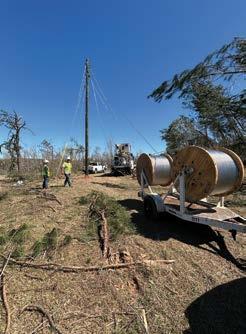
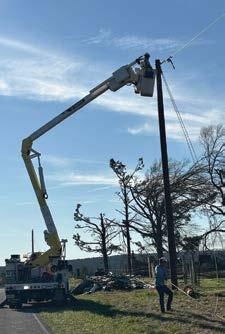
Following recent severe weather, North East Mississippi Electric Power Association crews stepped up to assist Magnolia Electric Power Association in restoring service to its members. Crews worked tirelessly, setting poles and making necessary repairs to rebuild the damaged system to bring power back to a ected areas.
As part of a mutual aid e ort, North East Power was proud to support fellow cooperative members in a time of need.
This collaboration highlights the dedication and resilience of linemen, who work in challenging conditions to ensure reliable power for communities.
Thank you to our linemen for their hard work and commitment to keeping the lights on!




North East Mississippi Electric Power Association is proud to announce that it has partnered with the Tennessee Valley Authority to award STEM grants to local teachers in our service territory.
The TVA STEM Classroom Grant Program is designed to fund STEM learning projects in classrooms and schools in the TVA service area. Each organization selected received up to $5,000.
“We are proud to support the incredible teachers in our service area as they inspire the next generation of innovators with STEM education,” said Sarah Brooke Bishop, communications and marketing manager at North East Power.
The grant recipients are:
• Laurie Beth Ellis, Della Davidson Elementary School. Ellis was selected to purchase coding robots for her classroom.
• Jivaro Jones and Mary Martha Crowe, Oxford High School. The grant will be used for the OHS drone program.
TVA’s STEM grant program supports classroom e orts by providing resources to enhance science, technology, engineering, and math education. Applications for these grants are open annually and available on the TVA website.

















May tends to be an easier month on us with longer days and warmer temperatures that transition us into summer. I’m eager to put the spring showers behind us, especially the severe weather that our area faced in recent months. I am reminded of how well our distribution system operated during this period, and the many reasons it did. No matter how well we perform, it’s important that we always keep our eye on the ball.
Maintaining clearance of vegetation from our overhead lines is a prime example of the reliability that Northcentral members experienced during winter and severe weather events so far this year. As always, I am extremely proud of how our employees responded during these events. In those times when they were called upon to restore power, it was done quickly. Most importantly, it has been done safely.
In May, we observe National Electrical Safety Month. While we work to maintain our culture of safety all year, May is a time to place emphasis on keeping not just our employees, but our
























community safe. It’s why we invest in education and training, hazard recognition, vegetation management, and personal protective equipment. We strive for 100% of the rules for 100% of the employees and community, 100% of the time.
We recently performed a residential member satisfaction study where we solicited feedback from several of you, representing the various communities that we serve. Your participation is appreciated, and these responses give valuable insight as we make decisions going into future years.
Stay safe.

by Kevin Doddridge General Manager/CEO






















































by Abby Berry







Every May, Electrical Safety Month serves as a vital reminder of the importance of preventing electrical hazards at home. Electricity powers nearly every aspect of modern life, but if handled improperly, it can pose serious risks, including injuries and property damage.
Northcentral Electric understands the risks associated with improper electricity use, which is why we’re committed to reminding you to stay vigilant and practice electrical safety not only in May, but year-round.
By following key safety practices, you can reduce the risk of electrical hazards and ensure your family stays protected.












Here are five essential tips for powering up safely at home
1. BE VIGILANT Regularly inspect your home’s electrical system for any signs of damage or outdated components and replace any frayed electrical wires or cords. The Electrical Safety Foundation International estimates roughly 3,300 home fires originate from extension cords every year, either from overloading, overheating, or fraying. If you’re relying on extension cords as permanent power solutions, consider contacting a qualified electrician to install additional outlets where you need them.
2. USE SURGE PROTECTORS Safeguard your sensitive electronics and appliances from surges with surge protectors. These handy devices help divert excess voltage away from your electronics, reducing the risk of damage or electrical fires. Not all power strips include surge protection, so read the product label carefully. Additionally, surge protectors can lose e ectiveness over time and should be replaced when damaged or outdated.
3. PRACTICE SAFE POWER STRIP USE Avoid overloading electrical outlets with power strips that exceed the outlet’s capacity. High-energy devices, like heaters, microwaves, and hairdryers should be distributed across multiple outlets. Overloading an outlet with a “busy” power strip can lead to overheating and create a fire hazard, so be sure to check the power strip’s wattage rating before plugging in items.



4. WATER AND ELECTRICITY DON’T MIX It may seem obvious, but accidents involving water contact with electrical items happen. Always keep electrical appliances and devices away from water sources, like sinks, bathtubs, or swimming pools. Make sure your hands are dry before touching any electrical switches or appliances — never handle electrical devices with wet hands. Ground Fault Circuit Interrupters (GFCIs) should be installed in areas where water and electricity are typically in close proximity, including kitchens, bathrooms, and outdoor outlets.
5. EDUCATE FAMILY MEMBERS One of the best ways to ensure the safety of everyone in your household is to talk about electrical safety. Teach children not to play with electrical outlets or appliances and ensure they understand the potential dangers of electricity. Create and practice a home fire escape plan that includes electrical safety precautions in case of emergencies.
Practicing electrical safety at home is essential for protecting your family, property, and peace of mind. Remember, electrical safety isn’t just a one-time e ort — it’s a year-round responsibility. Taking these steps can help ensure a safer, more secure home for you and your loved ones.
Abby Berry writes on consumer and cooperative a airs for the National Rural Electric Cooperative Association.
Northcentral Electric Cooperative was saddened to learn of the passing of Bob Dever. Dever served as the general manager of Northcentral from 1998 until his retirement in 2003. A graduate of Horn Lake High School in 1957, he served in the U. S. Army and earned his bachelor’s degree in electrical engineering at Christian Brothers University. Upon retirement, Dever and his wife Pat moved to Mesa, Arizona. Together they have three sons and three grandchildren. We, at Northcentral, o er our condolences to the Dever family in their loss.









































by Leah Grant, CKAE















Are you ready to lower your energy costs while supporting a more reliable power grid? With the EnergyRight Smart Thermostat Rewards Program, available to residential members, you can do just that — easily and at little to no extra cost.
Here’s how it works: During periods of peak energy demand, the program encourages participants to approve voluntary adjustments to their smart thermostat temperature settings. This small action helps reduce stress on the power grid, which could prevent outages and lowers the need for costly wholesale power from the open market. By participating, you can earn financial rewards and enjoy the satisfaction of contributing to a greener, more e cient energy future.
Key benefits of joining:
• Save on energy costs: Reduce your monthly energy bills by voluntarily adjusting your thermostat for short periods when requested.
• Earn rewards: Enjoy annual rebates of $20 to $65 when you participate in at least 65% of requested adjustments.
• Help strengthen the grid: By adjusting your thermostat, you’re reducing overall demand on the power grid, ensuring energy reliability.
• Stay in control: It’s smart and simple with a smart thermostat from a trusted partner. You can approve an event and forget it, or don’t approve it if it’s not a good time. Your participation is your choice and requires little e ort!
• Community impact: When many people adjust their thermostat at the same time, the collective action has a massive impact on power reliability and a ordability for everyone.
Typical adjustments to your smart thermostat settings will be no more than four degrees up or down, for up to four hours, between 6 a.m. and 10 p.m.
1. Sign up for the program by scanning the QR code below.
2. Install a smart thermostat: If you already have a qualifying thermostat, simply select it among the eligible models and follow the prompts. Once enrolled, you will receive a one-time $65 enrollment rebate check.
Need a thermostat? We can help: If you don’t have a qualifying thermostat, you can purchase one on the TVA EnergyRight Marketplace during enrollment and receive a $100 rebate check.
3. Relax and earn: Once enrolled, you will receive notifications to adjust your thermostat during peak times, but only upon your approval — no need for you to remember when the grid needs your help.
You may opt-out of an event at any time by adjusting your thermostat with your mobile app, web browser, or thermostat settings. However, you must approve at least 65% of requested adjustment to receive your $65 (year-round) or $20 (summeronly) participation rebate. You can also withdraw from the Smart Thermostat Rewards program at any time.

The collective e orts of households on Northcentral’s system during peak times can have a huge e ect. By joining this program, you’re not only lowering your energy bills, but you’re also helping ensure more reliable and a ordable energy for everyone. It’s a win-win! Scan the code to enroll in Smart Thermostat Rewards today!
If you would like more information please reach out to Leah Grant, 662-932-3426 or lgrant@northcentralelectic.com








by Scott Flood
When lineworkers are perched in a bucket truck, repairing power lines along a busy road, they have good reason to be concerned about their safety. However, most are less apprehensive about problems like working with high voltages or falling. Their biggest worry is also the most unpredictable: a distracted driver slamming into their vehicle or a nearby power pole.
The National Safety Council reported that 891 people were killed and 37,701 people were injured in work zone crashes during 2022 (the most recent statistics). Most of those crashes occur in construction sites, which are usually well-marked. Electric co-op crews are likely to face even greater danger, as they are often working alone along remote stretches of roads, frequently in heavy rain or other adverse weather conditions that can reduce their visibility.
The danger of work zone crashes led every state to adopt “move over” laws that require drivers to lower their speed and switch lanes when possible to protect emergency vehicles. The goal is to provide an added safety bu er and minimize the potential for accidents. Drivers caught violating the laws can face penalties, such as significant fines.
Compounding this issue is the dramatic increase in distracted driving. The National Transportation Highway Safety Administration has reported that as many as 1,000 Americans are injured each day because of activities that take drivers’ attention away from the road. The most common is reading and responding to text messages. If a driver traveling at 55 miles per hour glances at their phone for just five seconds, they’ll have traveled the length of a football field before returning their gaze to the road.
The design of today’s vehicles contributes to distraction. Many vehicles have complex controls for entertainment and climate that demand the driver take their eyes o the road to make even simple adjustments.
Geography can also be a factor. Co-ops serving rural and remote areas often have power lines along twisty and hilly roads. Locals accustomed to driving those roads at fairly high speeds may be startled and have little time to react when they encounter a work crew past a hill or around a curve.
Besides the potential for lineworker injuries, accidents can also damage or destroy expensive service vehicles, reducing a co-op’s ability to respond to outages and other problems. Power poles and other infrastructure may also su er severe damage.
Additionally, many of the tasks performed by lineworkers, such as reconnecting high-voltage power lines, are inherently dangerous and require their complete focus. When their attention is distracted by speeding or noisy vehicles, they’re more likely to make mistakes that can complicate the repair or cause injury.
Nor are co-op employees at risk only when their vehicles are parked and repairs are underway. Lineworkers frequently have to drive slowly along the shoulder of roads to pinpoint broken power lines or failed
transformers, especially in darkness or conditions that interfere with visibility.
Many state transportation agencies have work zone awareness programs. Amplifying those e orts by devoting part of a co-op’s advertising, publicity, and social media reminds co-op members and other drivers of the importance of giving lineworkers a wide berth.
Co-ops are considering ways they can modify bucket trucks and other service vehicles to make them more visible. Bright colors and additional lighting such as flashing strobe lights and lighted detour arrows can attract attention from a distance. Reflective “work zone ahead” signs can also alert drivers to be ready for an unusual situation. Sometimes, a little bit of extra attention is all that’s needed to prevent a serious incident.
For more than four decades, business writer Scott Flood has worked with electric cooperatives to build knowledge of energy-related issues among directors, sta and members.



Mississippi’s “Move Over” law was passed to safeguard law enforcement, fire, highway construction workers, and utility crews and vehicles.
According to the law, motorists passing a utility vehicle must slow down and yield the right-of-way by changing lanes, keeping at least one empty lane where possible. If a lane change is impossible, a driver must slow down and be prepared to stop.
Violators may be fined up to $250 for failing to comply and up to $1,000 if there is damage to the o cial vehicle or injury to any driver or passenger of an o cial vehicle.



Besides






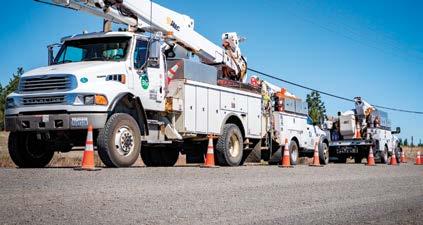












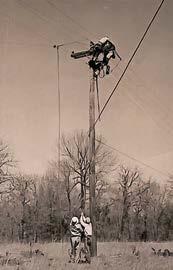



























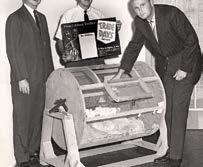





COLUMBIA: 601-736-2666 | HATTIESBURG: 601-264-2458 | PURVIS: 601-794-8051 | WIGGINS: 601-928-7277 Member owned. Locally operated. That’s the cooperative







In May 1938, Pearl River Valley Electric was formed and initially provided service to 228 homes. In 87 years, membership has increased to over 43,000 with the co-op maintaining more than 6,000 miles of line. Every May, we like to look back at how our cooperative has grown since those early years, when local citizens banded together to electrify their communities. While the faces have changed at PRVEPA, our goal of providing safe and a ordable electricity has not. In honor of our incorporation, we’d like to showcase a photo gallery of Pearl River Valley Electric through the years.


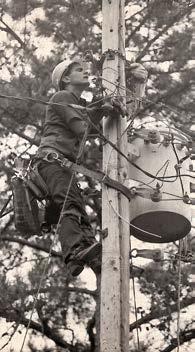
Pearl River Valley Electric’s distribution system has grown significantly over the past 87 years to meet the needs of our members. We now have more than 6,000 miles of power lines across our 12-county service area. Maintaining clear rights-ofway (ROW) along those lines is vital to the Association’s ability to provide reliable service. It is also necessary to maintain a proper distance between trees and power lines to ensure public safety.
We want members to understand that maintaining ROW is not an inconvenience, it’s a necessity. Controlling vegetation within the ROW floor assures safe access for employees when they are troubleshooting outages and repairing downed power lines. The overall result of ROW maintenance is quicker restoration of outages during storms.

Clearing brush and other low-growing vegetation is accomplished by a combination of bush-hogging and herbicide application. We use o -the-shelf, non-restrictive herbicides because they are e ective, economical, and environmentally friendly. They are not harmful to humans, pets, or livestock. Managing vegetation in this way also allows native grasses and wildflowers to grow, thereby improving the aesthetics and wildlife habitat along the ROW.
For a more detailed map of this year’s ROW spraying, please visit the help center at prvepa.com and click the “Technical Services” box.

Also, if you have any questions about our ROW maintenance program, please feel free to call any of our o ces. Thank you for your understanding and cooperation.


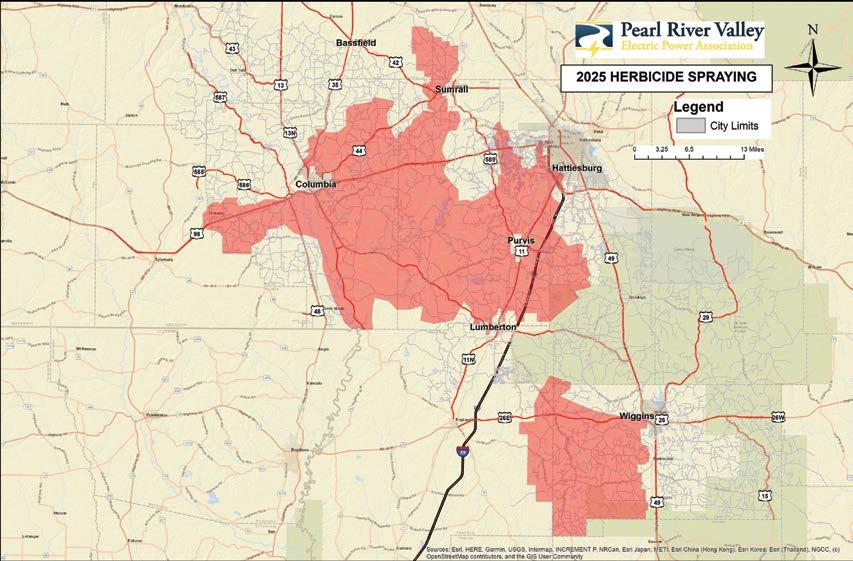








by Scott Flood
When lineworkers are perched in a bucket truck, repairing power lines along a busy road, they have good reason to be concerned about their safety. However, most are less apprehensive about problems like working with high voltages or falling. Their biggest worry is also the most unpredictable: a distracted driver slamming into their vehicle or a nearby power pole.
The National Safety Council reported that 891 people were killed and 37,701 people were injured in work zone crashes during 2022 (the most recent statistics). Most of those crashes occur in construction sites, which are usually well-marked. Electric co-op crews are likely to face even greater danger, as they are often working alone along remote stretches of roads, frequently in heavy rain or other adverse weather conditions that can reduce their visibility.
The danger of work zone crashes led every state to adopt “move over” laws that require drivers to lower their speed and switch lanes when possible to protect emergency vehicles. The goal is to provide an added safety bu er and minimize the potential for accidents. Drivers caught violating the laws can face penalties, such as significant fines.
Compounding this issue is the dramatic increase in distracted driving. The National Transportation Highway Safety Administration has reported that as many as 1,000 Americans are injured each day because of activities that take drivers’ attention away from the road. The most common is reading and responding to text messages. If a driver traveling at 55 miles per hour glances at their phone for just five seconds, they’ll have traveled the length of a football field before returning their gaze to the road.
The design of today’s vehicles contributes to distraction. Many vehicles have complex controls for entertainment and climate that demand the driver take their eyes o the road to make even simple adjustments.
Geography can also be a factor. Co-ops serving rural and remote areas often have power lines along twisty and hilly roads. Locals accustomed to driving those roads at fairly high speeds may be startled and have little time to react when they encounter a work crew past a hill or around a curve.
Besides the potential for lineworker injuries, accidents can also damage or destroy expensive service vehicles, reducing a co-op’s ability to respond to outages and other problems. Power poles and other infrastructure may also su er severe damage.
Additionally, many of the tasks performed by lineworkers, such as reconnecting high-voltage power lines, are inherently dangerous and require their complete focus. When their attention is distracted by speeding or noisy vehicles, they’re more likely to make mistakes that can complicate the repair or cause injury.
Nor are co-op employees at risk only when their vehicles are parked and repairs are underway. Lineworkers frequently have to drive slowly along the shoulder of roads to pinpoint broken power lines or failed
transformers, especially in darkness or conditions that interfere with visibility.
Many state transportation agencies have work zone awareness programs. Amplifying those e orts by devoting part of a co-op’s advertising, publicity, and social media reminds co-op members and other drivers of the importance of giving lineworkers a wide berth.
Co-ops are considering ways they can modify bucket trucks and other service vehicles to make them more visible. Bright colors and additional lighting such as flashing strobe lights and lighted detour arrows can attract attention from a distance. Reflective “work zone ahead” signs can also alert drivers to be ready for an unusual situation. Sometimes, a little bit of extra attention is all that’s needed to prevent a serious incident.
For more than four decades, business writer Scott Flood has worked with electric cooperatives to build knowledge of energy-related issues among directors, sta and members.



Mississippi’s “Move Over” law was passed to safeguard law enforcement, fire, highway construction workers, and utility crews and vehicles.
According to the law, motorists passing a utility vehicle must slow down and yield the right-of-way by changing lanes, keeping at least one empty lane where possible. If a lane change is impossible, a driver must slow down and be prepared to stop.
Violators may be fined up to $250 for failing to comply and up to $1,000 if there is damage to the o cial vehicle or injury to any driver or passenger of an o cial vehicle.




Besides the potential for lineworker injuries, roadside accidents can also damage or destroy expensive service vehicles, reducing a co-op’s ability to respond








































MONDAY, MAY 26





Pearl River Valley Electric honors those who courageously gave their lives.

All Pearl River Valley Electric o ces will be closed in observance of Memorial Day.
Dispatchers will be available. Report outages by calling 855-2PRVEPA.
Pearl River Valley Electric is on social media.
Keep up to date with PRVEPA news and receive information on outages.
Simply search for @MyPRVEPA on Facebook and X to follow us.
































































































































• Applications are available at PRVEPA o ces and at prvepa.com.
• Completed applications must be postmarked or emailed by Aug. 8.




• Scholarship recipients must be a PRVEPA member, spouse, or child of a member participating in the Round Up program.




• Recipients must be full time (12 hours or more per semester) freshmen students enrolled in academic or career-technical programs.






• Scholarship funds will be credited to each student’s college account — no checks will be issued to individuals.

• Scholarships should be awarded by the end of September. Students must be enrolled in good standing at the time funds are released to the colleges.







Funded by members who are rounding up their monthly bills, these scholarships are intended to assist students who will attend a Mississippi community college as a freshman this fall.

























PONTOTOC 662-489-3211 • Fax: 662-489-5156
P.O. Drawer 718 • 12 South Main Street, Pontotoc, MS 38863














662-983-2727 • Fax: 662-983-1335










by Jennifer Johnson
May is Electrical Safety Month. We use electricity in so many ways at home. Let’s review some important tips to help keep you safe:
• Install smoke alarms, test them regularly, and replace them every 10 years.

• Never turn o or disable a smoke alarm or a carbon monoxide alarm.
• Extension cords are temporary solutions. Never use them on large appliances.
• Never used damaged cords.








• Double check to make sure your appliances are turned o when not in use.
• Use an outlet cover or plastic outlet cap to keep children safe around outlets.

• Do not run cords through walls, doorways, ceilings, or under rugs or carpet. If a cord is covered, heat cannot escape and can create a fi re hazard.























• When outside, watch for overhead power lines every time you use a ladder, work on roofs and trees, or carry long tools or loads. Keep kites, model airplanes, and metallic balloons away from power lines.
































































by Jennifer Johnson
Growing up in Blue Mountain, PEPA Collections Manager Mary Williamson never thought she’d be cooking desserts for a restaurant. She had limited experience in the kitchen growing up – mostly peeling potatoes and other simple tasks.
During high school, she and her cousin, Beatrice, decided to try some recipes from a junior cookbook Williamson’s mother had purchased for her. Soon after, tomato cakes with cream cheese icing, (they taste like a spice cake, Williamson said) tuna salad, and cookies with chocolate candies were on the menu, and the pair enjoyed their tasty new hobby.
Time moved on, and Williamson said she didn’t do any baking for years. However, that changed in 1997 when she met husband Terry.

“I was invited to a party, and he was there. We ended up exchanging phone numbers. I also found out carrot cake was his favorite, so I made one for him.”
Years later, Williamson’s brother-in-law opened Montgomery’s on Main, and he asked Williamson about making desserts for the restaurant. They decided on chocolate cake and strawberry cake, which are typically customer favorites. She bakes four to six cakes a month for the restaurant, and occasionally, she will get an order from someone in the community to make one for an event.
Williamson helps to count votes in local elections, and she often makes a treat for her fellow workers to enjoy. She’s been counting since around 2001, and during that time, she’s made her “famous” chocolate cake, peanut chews, and other sweets.
Williamson said she has “millions of recipes.” She prefers simpler ones right now but said she hopes to venture out more someday. “I want to try something that has a cake, filling, and a ganache, and maybe even another layer of something. I hope to eventually make something that takes all day. Right now, I just don’t have time for multiple steps.”
She’s a self-proclaimed foodie who likes to try new foods – just nothing too “out there.” Italy is on her bucket list because she wants to sample their pastas. She would like to go back to the Bahamas for an ice cream she tried on a previous trip there.
Williamson hopes in the next 10 years to be retired, enjoying life, and taking in all it has to o er. She knows what it’s like to nearly lose that gift. “It’s amazing how quickly things can change. On July 6, 2015, I met my mom at a nursing home to check on my dad. I was about to head to Tupelo to meet a friend. I remember asking my mom to please wear her seatbelt. My mom didn’t seem too worried about it because she was going to another location nearby. I remember saying, “Anything can happen.”
“We had just gotten back from a wonderful trip to Miami and Jacksonville, Florida, and I



was reminiscing in my mind about how great the trip was, when all of a sudden I noticed a truck coming from the other direction. I wasn’t sure what was going on. It was going from one side of the road to the other, crossing the ditch and going back across the road. My mind was racing, trying to figure out what I should do. There was really no place for me to go. I remember hearing metal crunch, and then it all stopped. I heard a helicopter. I woke up in a hospital bed, and my family was there. I was in the hospital for a few weeks before I was able to go home with a walker,” she said.
Williamson said that was an extremely di cult time in her life. It was a long journey, “but God allowed me to recover. Things like this remind you of how blessed you are. I got a second chance at life. Things can change in the blink of an eye.”

Pontotoc Electric Power Association is proud of our graduate. You did it!
Jacee Hope McClellan is graduating from South Pontotoc High School. She is the daughter of Rhianna and Tucker Holloway and William and Karley McClellan.
Jacee is a member of the Beta club, and she has played softball for the South Pontotoc Lady Cougars for six years. She attends church at Green Valley Baptist Church where she participates in the youth group.
Jacee will be graduating with honors. She was named Division O ensive Co-MVP, .300 club, .400 club, and First Team All Division. She received the Stolen Base Award and was an NMSBCA All Star in 2025.
Jacee plans to attend Northwest Community College on a softball scholarship and study in the dental field.



















Enjoy making and serving these treats for the ones you love!
FIRST LAYER:
1 cup flour
½ cup pecans
1 stick oleo
Mix and put in 9 x 11 x 2 pan. Bake at 375 degrees for 15 minutes. Allow to cool.
SECOND LAYER:
1 cup Cool Whip
8 ounce. cream cheese
1 cup powdered sugar
Mix and spread over first layer. Chill 15 minutes.
CAKE:
1 box butter cake mix
1 can Mandarin oranges
3 eggs
¾ cup vegetable oil
THIRD LAYER:
2 packages instant chocolate pudding
3 cups milk
Mix and spread over second layer.
FOURTH LAYER:
Spread with Cool Whip and chill overnight.
Serves 12. (Note: This recipe was given to me by my daughter, Dr. Jerri Lamar Kantack.)
Jennifer
Johnson (PEPA HR Manager)
1 large can crushed pineapple
1 vanilla instant pudding
1 teaspoon lemon juice
1 large Cool Whip
Preheat oven to 325. Mix cake ingredients and beat for 3 minutes. Pour mix evenly between 3 cake pans in order to make 3 layers. Cook the cake for 25-30 minutes. Mix frosting ingredients together. Once the cake cools completely, place frosting in between each layer and frost top of cake.



Mike (PEPA Retiree) and Shirley Montgomery
4 ounces cream cheese, softened
8 ounces Cool Whip
¾ cup powdered sugar
1 graham cracker crust
¾ cup creamy peanut butter chocolate syrup
Beat cream cheese, sugar, and peanut butter with electric mixer until well mixed. Add whipped topping and beat until smooth. Pour mixture into graham cracker crust. Drizzle with chocolate syrup. Freeze six hours or overnight. Serve frozen. Serves 8.
Mary Williamson (PEPA Collections Manager)
2 cups graham cracker crumbs
3 bananas, sliced
3 sticks oleo
1 large can pineapple, drained
2 eggs
1 large Cool Whip
2 cups confectioner sugar
1 cup pecans
1 small jar cherries
Mix graham cracker crumbs with 1 stick melted oleo. Place in 9 x 13 Pyrex dish. Mix eggs, sugar, and 2 sticks oleo. Blend for 10 minutes. Pour over crust. Layer sliced bananas, pineapple, and Cool Whip. End by adding cherries and pecans on top. (This is Rosemary Windham’s recipe.)














It’s easy to get distracted during our daily routines. In this fast-paced world we live in, our minds can wander while trying to complete a task. Sometimes we take shortcuts that could possibly result in unintended risks to our safety or the safety of others.
Linemen do not have the luxury of these distractions. They must be focused at all times – their lives and the lives of their coworkers depend on it. Linemen must know the overall objective of their current job, as well as where their coworkers are and what they are doing at all times. For this reason, there is nothing more important to our electric cooperative than safety education and training.


During May – Electric Safety Month –and every month of the year, Singing River Electric employees participate in safety meetings to review and discuss safety topics and how our safety rules address these topics. We have employees who serve on safety committees, a dedicated safety department, and a safety manual that is kept updated and is distributed to all employees.
Safety is a concern for all, and this month, we ask you to take time to discuss safety with your family. Consider electrical safety and all hazards around your home or business.
Singing River Electric is your source for power and information. We partner with our local schools for safety education and provide online resources for you and your family. Take advantage of all the safety resources on our website at singingriver.com/electric-safety.
by Brian Hughey
General Manager and CEO
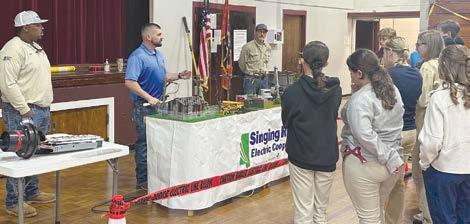

















Gabe Robbins Energy Services Representative robbins@singingriver.com




Routine maintenance on electrical appliances in your home can result in considerable energy savings. Appliances like refrigerators, air conditioning/heating units, clothes dryers, and dishwashers all need some sort of maintenance throughout the year. Neglecting to do so can lead to a drop in e ciency and e ectiveness in your appliances.
• Refrigerator – Clean lint and dirt from refrigerator coils every six months to a year, or more often if pets are in the home.
• Dishwasher – Clean the filter, spray arm, and door seal regularly; load dishes properly to optimize cleaning; use the correct detergent and rinse aid for your model.
• Air conditioning/heating unit –Change the air filter regularly; clean the outdoor unit; check/clean the condensation drain line; schedule professional maintenance annually.
• Clothes dryer – Clean the lint screen after each use; check and clean the vent system every 6-12 months; wipe down the drum periodically.
Use appliances that create unwanted heat, like your dishwasher and clothes dryer, during the evening hours when there are cooler temperatures outside. singingriver.com/ways-to-save
11187 Old 63 South, Lucedale
Registration opens at 5 p.m. Meeting begins at 6 p.m.

To conduct business at the annual meeting, a quorum of at least 10% of the membership is necessary. The quorum is derived by adding the number of members present at the meeting, the number of valid online votes, and the number of valid proxies received.









THERE ARE THREE WAYS TO PARTICIPATE: IN PERSON, BY PROXY, & ONLINE
Six members who vote online or return their proxies by the June 17 deadline will be selected to receive a $250 CASH prize.
One member who votes online or returns the proxy by the deadline will receive a special grand prize of $500 CASH!
The annual membership meeting’s business section will include the cooperative’s financial, management, and board reports, as well as the board of directors election. SRE has a 10-person board of directors elected from the membership in three geographic districts. Each year, one director post from each district is up for election. Every three years, District 3 has two director posts open. Directors are elected for a three-year period.
Nominations for election to the board of directors are made by petition. Interested members must acquire signatures of 25 SRE members on a form provided by the cooperative. Applicants must complete and return a director candidate packet to the Lucedale o ce and be certified by the Credentials and Election Committee before being placed on the ballot. The deadline for nomination by petition to be placed on the 2025 Annual Meeting Notice was Feb. 28, 2025. This deadline and a notice for nominations was placed in the January and February 2025 issues of Today in Mississippi magazine.
Annual meeting notices with online voting instructions and proxies will be mailed on Monday, May 12, to all members. The deadline for voting online and returning proxies is Tuesday, June 17, at the close of business. Your participation in the director election is important because it counts toward the quorum needed to hold and conduct business at the meeting.
Any member may vote in person at the June 26 membership meeting. Members can also vote online or by proxy. Each member is entitled to one vote regardless of the number of accounts in the member’s name. A proxy may be assigned to the board as a whole. A member can vote up to 200 assigned proxies at the membership meeting. The presence of a member at the meeting or an online vote, or in the case of joint membership the presence of a spouse, shall revoke the proxy. Members who vote online or return their proxy will qualify to win up to $500 cash. Those attending the annual meeting will be eligible for attendance prizes.
This year’s slate of nominees was approved by SRE members serving on the Credentials and Election Committee. According to the cooperative bylaws, the candidates’ names will be placed in the nomination for election to a three-year term beginning June 26, 2025, at the annual meeting.
DISTRICT 1 POST 1 – To represent Greene, Perry and Wayne counties in Mississippi, and Washington County in Alabama.
Stanley R. Busby
DISTRICT 2 POST 1 – To represent George and Stone counties in Mississippi, and Mobile County in Alabama.
Ronald Wilson
DISTRICT 3 POST 1 – To represent Jackson and Harrison counties in Mississippi.
Olin Howard Davis
Ryan Earley









“Let me check Facebook one more time before bed.” “I'll send that final email, then I'll go to sleep.” “Let's watch just one more episode.”
Sound familiar? Whether it's you, your spouse, or your kids, too often technology is getting in the way of a good night's sleep. A 2018 study showed that 70% of adults use social media in bed, which had consequences including insomnia, daytime sleepiness, bad moods, and shorter sleep times.
Better and longer sleep is possible –ExperienceIQ is here to help. See who is on a device when they shouldn’t be. Use the “Set schedule” feature to determine when individual devices can or can’t be used. Each family member can have a di erent device bedtime, if needed, and you can help your family instill better sleep habits by establishing technology quiet times in your home.
Included in Speed Fanatic (2 Gig) and Entertainment Enthusiast (1 Gig) packages. Only $5/month with the Everyday Scroller (300 mbps) package.
MAY 2025


Step 3: Fiber Construction
Running fiber lines on poles and burying lines underground
• Kreole
• Monaco Lake
• Singing River Mall
• Gautier
• Fountainbleu
Step 4: Splicing
All identified poles have been replaced and upgraded to allow space for fiber internet lines.
The other four fiber construction steps are still in progress for several of our substation areas. Singing River Connect is one step closer to completing our build-out and providing lightning-fast fiber internet to Singing River Electric members!
Step 5: Service Drop & Drop
Splicing & Step 6: Installation
• Hamill Farm
• Ocean Springs
• Gulf Park Estates
• Sunplex
• Bayou Cassotte
Connecting fiber lines to the network
• Fort Bayou
Bringing mainline fiber to the exterior of your home and connecting your home to blazing-fast fiber internet
• Tucker Road
• Forts Lake
• Helena
• Helena Industrial
• Escatawpa South
• St. Martin
• Martin Blu
• Hickory Hills
• All previously opened areas


After working long hours restoring power in our service area on March 15 during the extreme wind event, a 15-man Singing River Electric crew traveled on March 17 to Magnolia Electric Power where tornadoes caused extensive damage. Magnolia Electric first reported having 270 broken poles, but that number grew to 321 as assessment continued. The areas around Tylertown, Progress, and Salem are in Magnolia’s service area. Thank you to these linemen for living out the 6th Cooperative Principle – Cooperation Among Cooperatives.


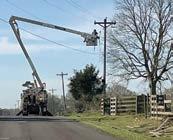

McLain Attendance Center received a $2,500 NHN Grant to purchase robotics kits to support the school’s robotics education enhancement program. The students built a farm and had a scenario where severe weather damaged fencing and trees; they used the robots to rebuild the fence, corral the animals, and stack the toppled trees.

A $2,500 NHN Grant from Singing River Electric purchased lumber and tin to construct an awning for the George County High School Rebel Baseball team’s fieldhouse.
Visit singingriver.com/my-community for information on how to apply for Singing River Electric’s Neighbors Helping Neighbors Community Grant program. Grants for up to $2,500 are awarded to non-profits in SRE’s service area three times a year in January, May, and September.








At Southern Pine, we talk a lot about preparing for bad weather— keeping emergency supplies ready, fi nding safe shelter, and having a plan in place. That preparation matters. But when the storm passes, and you’re left looking at what’s next, that’s when the real recovery begins.
Tornadoes and severe storms can leave behind much more than broken trees and downed lines. They leave uncertainty, including questions about how to get power restored, especially if your home is damaged.
Southern Pine is committed to rebuilding our system as close as possible to how it was before the storm. If your home was damaged and you will not need service at that location for an extended period of time, let us know, so we can update our restoration e orts. Our crews — and sometimes contractors working alongside us — will continue clearing power line debris in the following weeks. It’s part of our promise to see the work through, not just fl ip the switch and move on.









If your home has been severely damaged, it must be inspected by a licensed electrician before we can safely restore power. Restoring electricity to a compromised structure could create serious safety risks — and the last thing we want is to make a tough situation even worse.
Storm season is hard, but it’s easier when you know you’re not facing it alone. From the fi rst warning to restoring power to your home, we’re here for you — before and after the storm.
If you need us, call 800-231-5240 or visit southernpine.coop. Your safety is our priority, and your trust is our greatest responsibility.

by Chris K. Rhodes
President/CEO Southern Pine Electric

















MAY 26


On Memorial Day, we pause to honor the men and women who gave their lives in service to our country. Their sacrifice secured the freedoms we enjoy today, and their courage and selflessness remain the foundation of our nation’s strength.
This day is more than the start of summer — it’s a time to reflect, remember, and give thanks. As we gather with loved ones, we hold close the memory of those who never came home. By honoring them, we keep their legacy alive and remember the true cost of freedom.

































Each May, we recognize Electrical Safety Month — a time to raise awareness about how to prevent electrical hazards at home, at work, and out in the community. Electricity powers our lives, but it must be treated with care and respect.
Here are a few simple tips to keep you and your loved ones safe:
• Check cords and outlets If a cord is frayed or an outlet feels warm, stop using it. Have the outlet checked by a licensed electrician.
• Don’t overload power strips Plugging too many devices into one outlet can cause overheating and fi res.
• Keep electricity away from water Never use electrical appliances near water, and be sure your hands are dry before plugging anything in.
• Teach kids about safety Make sure children know to never stick objects into outlets and to stay away from power lines.
• Call before you dig Planning to plant a tree or install a fence? Call 811 fi rst to locate underground power lines.











As your local electric cooperative, we care deeply about your safety. Our crews work every day with high-voltage equipment, and they follow strict safety guidelines to protect themselves and others. We encourage our members to do the same at home.
This Electrical Safety Month, take a few minutes to look around your home and talk with your family about how to stay safe.
A little prevention goes a long way.


This month, we pause to honor some of the most selfless, loving, and strong people in our lives — our mothers. Whether by birth, by choice, or by heart, mothers are the steady hands and warm hearts that shape our families and communities.
At Southern Pine, we believe in the power of care, commitment, and putting others fi rst. That’s why this day resonates so deeply with us — because those are the very same values we see in the mothers among us every day. They lead with love, they give without asking, and they carry burdens quietly, all while making life brighter for those around them.
To every mom in our Southern Pine family — whether you’re rocking babies to sleep, cheering from the sidelines, o ering wisdom over co ee, or simply showing up with love — we see you. We thank you. And we celebrate you.
Happy Mother’s Day from all of us at Southern Pine Electric. Your love lights the way.


















More than 70 members and employees joined together on March 25 for the Lawrence County Member Circle, held at the Civic Center in Monticello. It was a great evening fi lled with good food, good fellowship, and meaningful conversations.
Brandon Henderson, district manager for New Hebron, welcomed the crowd and shared updates about the New Hebron district and the dedicated employees who serve the area. He was also available to answer questions from members throughout the evening.
CEO Chris Rhodes spent time visiting with members and answering thoughtful questions, o ering insight into the work Southern Pine is doing across our communities. Jan Collins, vice president of communications, also spoke with the group about a number of co-op programs designed to support our members. She gave an overview of the new Members Helping Members program and explained how it will provide assistance to all counties within Southern Pine’s service area.

“I love Member Circle meetings because they give us a chance to really connect with our members,” said Collins. “We get to share what’s going on, but more importantly, we get to listen. We want to hear your questions, your concerns, and your ideas. At the end of the day, our members are the owners of Southern Pine — and that means you deserve transparency and honest communication.”
Southern Pine Board President Billy Berry was also on hand to meet members, along with several employees from both the New Hebron district o ce and the headquarters team.

We’re proud to host Member Circle events in each of the 11 counties we serve on a rotating basis. If we haven’t been to your county yet, we’re looking forward to seeing you soon!







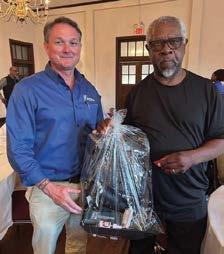

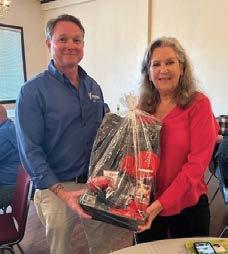







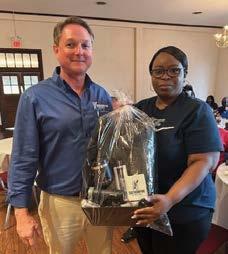





On March 15, severe storms swept across our service area, bringing high winds, heavy rains, and multiple tornadoes that left a path of destruction in several counties. These storms were widespread and didn’t focus on one area alone — damage stretched across much of our territory, with some of the most severe impacts felt in Smith County, particularly Taylorsville, several areas of Covington County, and the Bassfield area of Je erson Davis County.
Each county su ered significant damage to homes and other buildings. Fallen trees and downed power lines added to the devastation, leaving many without electricity. Covington and Je erson Davis counties also experienced the force of these storms, with tornadoes touching down and causing major damage to infrastructure and property.










Southern Pine crews responded immediately, and we were grateful to receive mutual aid from our neighboring cooperative, Dixie Electric, along with support from six of our trusted contractors. In total, 141 extra hands joined forces with our team to get the lights back on for 7,468 members. The damage required the replacement of 115 poles, 42 transformers, 40 crossarms, and one recloser — an incredible e ort from a dedicated team committed to serving you.
As always, we’re proud of the way our employees, partners, and communities come together in tough times. Thank you for your patience, your support, and your trust in Southern Pine. We’re honored to serve you—rain or shine.


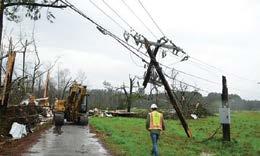














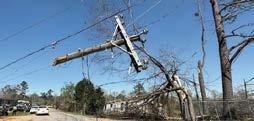

































































by Abby Berry





Every May, Electrical Safety Month serves as a vital reminder of the importance of preventing electrical hazards at home. Electricity powers nearly every aspect of modern life, but if handled improperly, it can pose serious risks, including injuries and property damage. We understand the risks associated with improper electricity use, which is why we’re committed to reminding you to stay vigilant and practice electrical safety not only in May, but year-round. By following key safety practices, you can reduce the risk of electrical hazards and ensure your family stays protected.




















1. BE VIGILANT Regularly inspect your home’s electrical system for any signs of damage or outdated components and replace any frayed electrical wires or cords. The Electrical Safety Foundation International estimates roughly 3,300 home fires originate from extension cords every year, either from overloading, overheating or fraying. If you’re relying on extension cords as permanent power solutions, consider contacting a qualified electrician to install additional outlets where you need them.
2. USE SURGE PROTECTORS Safeguard your sensitive electronics and appliances from surges with surge protectors. These handy devices help divert excess voltage away from your electronics, reducing the risk of damage or electrical fires. Not all power strips include surge protection, so read the product label carefully. Additionally, surge protectors can lose e ectiveness over time and should be replaced when damaged or outdated.
3. PRACTICE SAFE POWER STRIP USE Avoid overloading electrical outlets with power strips that exceed the outlet’s capacity. High-energy devices, like heaters, microwaves and hairdryers should be distributed across multiple outlets. Overloading an outlet with a “busy” power strip can lead to overheating and create a fire hazard, so be sure to check the power strip’s wattage rating before plugging in items.



4. WATER AND ELECTRICITY DON’T MIX It may seem obvious, but accidents involving water contact with electrical items happen. Always keep electrical appliances and devices away from water sources like sinks, bathtubs or swimming pools. Make sure your hands are dry before touching any electrical switches or appliances. Never handle electrical devices with wet hands. Ground Fault Circuit Interrupters (GFCIs) should be installed in areas where water and electricity are typically in close proximity including kitchens, bathrooms, and outdoor outlets.
5. EDUCATE FAMILY MEMBERS One of the best ways to ensure the safety of everyone in your household is to talk about electrical safety. Teach children not to play with electrical outlets or appliances and ensure they understand the potential dangers of electricity. Create and practice a home fire escape plan that includes electrical safety precautions in case of emergencies. Practicing electrical safety at home is essential for protecting your family, property and peace of mind. Remember, electrical safety isn’t just a one-time e ort — it’s a year-round responsibility. Taking these steps can help ensure a safer, more secure home for you and your loved ones. Abby Berry writes







Kevin Britt, Serviceman


Kevin Britt started working for Southwest Electric in January 2014 as a lineman on a construction crew. He was promoted to a crew leader in August. After three years, he became a serviceman. Britt, as he is a ectionally known, assists other servicemen with outages, security lights and notes to check when there is an increase of work concentrated in one area. He and his wife, Karen, live in the Loyd Star area and have three daughters and two sons.



Jarret Dyer, Serviceman
Jarret Dyer joined the Southwest Electric family in July 2014 as an apprentice lineman. He worked on a construction crew and the apparatus crew before becoming a serviceman in August 2021. Jarret serves our Members by installing and changing out security lights, installing new service connections, working outages, locating underground power lines for 811 requests and anything else that needs to be checked. He and his wife, Yashica, live in Fayette and have three children.
































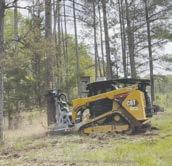




Southwest Electric’s Right-of-Way Department has a new piece of equipment to help clear dead danger trees near our power lines. The Caterpillar 299D3 XE Compact Track Loader is made for traversing rough terrain for land management. The feller buncher head attachment with a cutting throat opening can grab a tree up to 36” in diameter. Once the 52” cutting disc at the base slices through the tree, the buncher head can lift the tree. This enables the operator to control placement of the tree on the ground.
From January to mid-April, the skid steer has been used to cut down 3,110 trees. Danger trees are standing dead trees inside, and just outside, of the 20-foot trimming area on each side of our power lines. Southwest Electric spent $4.8 million on clearing trees and brush in the right-of-way area in 2024. In 2025, we have budgeted $4.9 million. The recent drought and pine beetle infestation left thousands upon thousands of dead trees in its wake.
Southwest Electric has 4,200 miles of power lines in our 2,500 square-mile service territory that includes heavily wooded areas with rough terrain. The new skid steer with special attachment is helping us combat the danger tree issue while maintaining the safety and increasing the e ciency of our crews. We are cutting trees every day to increase reliability and serve our Members with electricity.






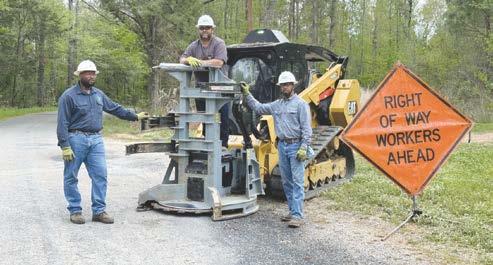































Have you tried our FREE Residential Energy Advisor tool? Simply answer 10 questions and provide details about, for instance, the size of your house and the type of insulation. The tool will provide you with an annual electric cost breakdown, showing how much of your energy dollars are spent on heating, cooling, cooking and more. It’s free and only takes a few minutes to complete.
Available to Southwest Electric Members:
Residential Energy Advisor
Conduct a Virtual Energy Assessment of your home. It takes just a few minutes to profile your home and get savings recommendations.
Energy Basics
Would you like to learn some basics about electricity and energy use? Use our resources to learn more about electricity.
Appliance Calculator
Try comparing the operating cost of a microwave or small countertop cooker to a conventional oven. You might just be surprised.











Calculator
How many televisions do you have? Many homes have more than one. Compare operating costs of di erent sizes and types of televisions.




































SERVING MORE THAN 12,600 ELECTRIC METERS IN SEVEN DELTA COUNTIES
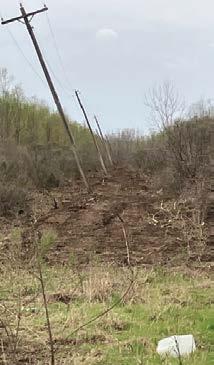

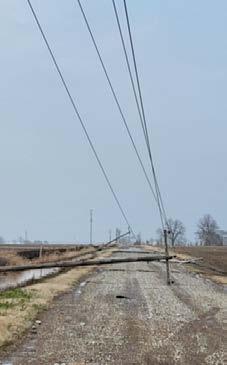





Hollandale - 662-827-2262 | Belzoni - 662-247-1909 | Greenville - 662-334-9543 | Rolling Fork - 662-873-4233 | REPORT OUTAGES 866-897-7250 @twincoepa twincoepa.com
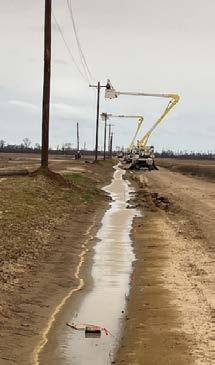

On March 15, members throughout our service area received heavy damage from tornadoes, high winds, and heavy rain.
We are thankful there were no major injuries, but the toll on personal property was widespread.
Twin County was also a ected with more than 244 broken utility poles and 2,556 meters without power. Typical storm damage is usually centrally located, but this damage was throughout our service area, including Issaquena, Humphreys, Washington, and Sharkey counties.
After a quick survey of damage, Twin County contacted our cooperative partners and long-term vendors for assistance. We are grateful to Central EPA, Coahoma EPA, and Tallahatchie Valley EPA for sending us additional line crews. At restoration peak, more than 100 lineworkers were working together to restore power. With teamwork, dedication, and knowledge, we were able to quickly restore all power e ciently and safely in four days.
We thank our members for their patience, support, and prayers.



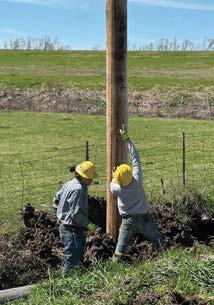





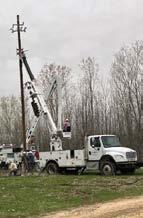
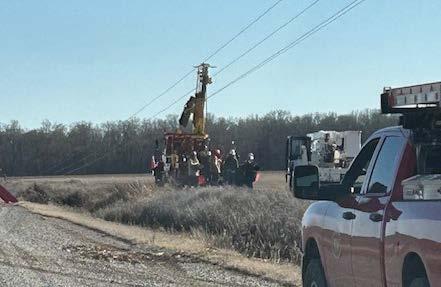
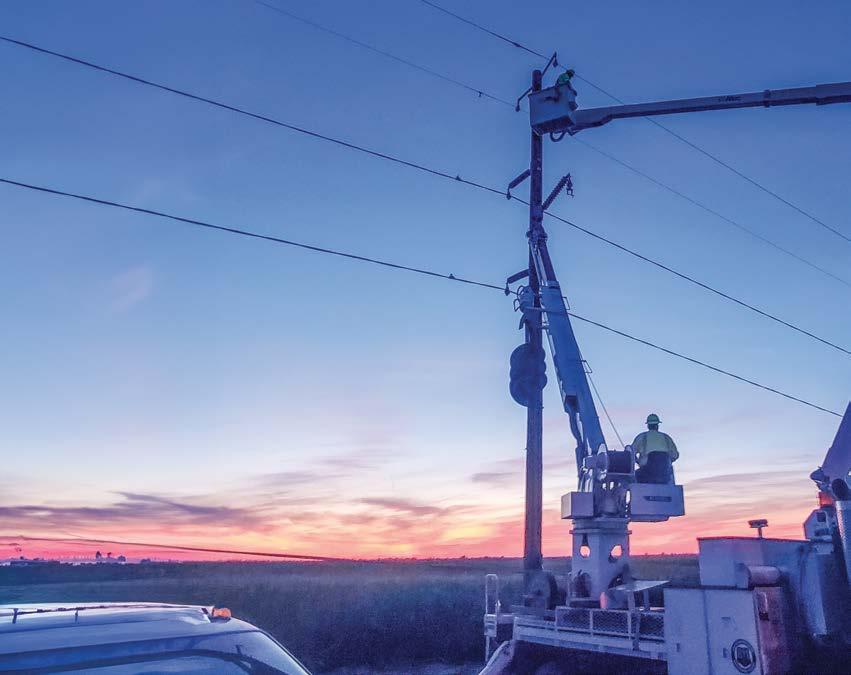










by Scott Flood
When lineworkers are perched in a bucket truck, repairing power lines along a busy road, they have good reason to be concerned about their safety. However, most are less apprehensive about problems like working with high voltages or falling. Their biggest worry is also the most unpredictable: a distracted driver slamming into their vehicle or a nearby power pole.
The National Safety Council reported that 891 people were killed and 37,701 people were injured in work zone crashes during 2022 (the most recent statistics). Most of those crashes occur in construction sites, which are usually well-marked. Electric co-op crews are likely to face even greater danger, as they are often working alone along remote stretches of roads, frequently in heavy rain or other adverse weather conditions that can reduce their visibility.
The danger of work zone crashes led every state to adopt “move over” laws that require drivers to lower their speed and switch lanes when possible to protect emergency vehicles. The goal is to provide an added safety bu er and minimize the potential for accidents. Drivers caught violating the laws can face penalties, such as significant fines.
Additionally, many of the tasks performed by lineworkers, such as reconnecting high-voltage power lines, are inherently dangerous and require their complete focus. When their attention is distracted by speeding or noisy vehicles, they’re more likely to make mistakes that can complicate the repair or cause injury.
Compounding this issue is the dramatic increase in distracted driving. The National Transportation Highway Safety Administration has reported that as many as 1,000 Americans are injured each day because of activities that take drivers’ attention away from the road. The most common is reading and responding to text messages. If a driver traveling at 55 miles per hour glances at their phone for just five seconds, they’ll have traveled the length of a football field before returning their gaze to the road.

Besides the potential for lineworker injuries, roadside accidents can also damage or destroy expensive service vehicles, reducing a co-op’s ability to respond to outages and other problems.




The design of today’s vehicles contributes to distraction. Many vehicles have complex controls for entertainment and climate that demand the driver take their eyes o the road to make even simple adjustments.
Geography can also be a factor. Co-ops serving rural and remote areas often have power lines along twisty and hilly roads. Locals accustomed to driving those roads at fairly high speeds may be startled and have little time to react when they encounter a work crew past a hill or around a curve.
Besides the potential for lineworker injuries, accidents can also damage or destroy expensive service vehicles, reducing a co-op’s ability to respond to outages and other problems. Power poles and other infrastructure may also su er severe damage.
Additionally, many of the tasks performed by lineworkers, such as reconnecting high-voltage power lines, are inherently dangerous and require their complete focus. When their attention is distracted by speeding or noisy vehicles, they’re more likely to make mistakes that can complicate the repair or cause injury.
Nor are co-op employees at risk only when their vehicles are parked and repairs are underway. Lineworkers frequently have to drive slowly along the shoulder of roads to pinpoint broken power lines or failed transformers, especially in darkness or conditions that interfere with visibility.
Many state transportation agencies have work zone awareness programs. Amplifying those e orts by devoting part of a co-op’s advertising, publicity, and social media reminds co-op members and other drivers of the importance of giving lineworkers a wide berth.
Co-ops are considering ways they can modify bucket trucks and other service vehicles to make them more visible. Bright colors and additional lighting such as flashing strobe lights and lighted detour arrows can attract attention from a distance. Reflective “work zone ahead” signs can also alert drivers to be ready for an unusual situation. Sometimes, a little bit of extra attention is all that’s needed to prevent a serious incident.
For more than four decades, business writer Scott Flood has worked with electric cooperatives to build knowledge of energy-related issues among directors, sta and members.






Mississippi’s “Move Over” law was passed to safeguard law enforcement, fire, highway construction workers, and utility crews and vehicles.
According to the law, motorists passing a utility vehicle must slow down and yield the right-of-way by changing lanes, keeping at least one empty lane where possible. If a lane change is impossible, a driver must slow down and be prepared to stop.
Violators may be fined up to $250 for failing to comply and up to $1,000 if there is damage to the o cial vehicle or injury to any driver or passenger of an o cial vehicle.

Co-ops serving rural and remote areas often have power lines along twisty roads. Locals accustomed to driving those roads at fairly high speeds may be startled and have little time to react when they encounter a work crew around a curve.


Mississippi Wildlife Heritage Festival • Leland
The festival is a combination of the Mockingbird Music Festival, Leland Crawfish Festival, and Frog Fest.
Twin County is proud to be a festival sponsor in e orts to preserve history, heritage, and the state’s outdoor traditions to educate the public on its vast natural resources.

The 26th Homecoming Festival • Metcalf
Twin County is excited to participate as a sponsor for this three-day event as a time for fellowship, love, and community support, bringing together residents and visitors alike for a weekend filled with celebration.

Future Tour Junior Golf Championship • Greenville
Twin County is proud to be included as a sponsor.
This year is the 30th anniversary of the tournament. The purpose is to grow the game with juniors and get kids interested in golf. Past participants have gone on to play collegiate golf, including winners on the LPGA and PGA tours.

Career Day at Simmons High School
Hollandale
Twin County thanks Simmons High School for the invitation to participate in their spring career day. Twin County enjoyed meeting students while handing out “electrified” No. 2 pencils.

Spring Blood Drive
Hollandale
Thank you to Mississippi Blood Services for partnering with Twin County Electric to provide a critical need for our residents.

Congratulations to Tim Harden on his retirement after more than seven years of dedicated service to Twin County. As a lineman and co-worker, Tim has played a vital role in keeping Issaquena, Sharkey, and Warren counties powered and has shown incredible skill, resilience, and commitment throughout his career.
Although we will miss Tim, we are excited for him to enjoy a well-earned retirement filled with outdoor hobbies including fishing and hunting. In addition, he’s looking forward to spending time with his lovely wife Tracey and their seven grandchildren.
Tim and Tracey also own Chuck’s Dairy Bar. The restaurant was destroyed by the Rolling Fork tornado. Although described as a very challenging time, Tim valued his camaraderie with his co-workers while ensuring countless meals were served.
June 2025 will be the one-year anniversary of the reopening of the restaurant.
Twin County wishes Tim all the best in this new chapter.
Thank you for your hard work, dedication, and countless hours to serving the members of Twin County.

































Yazoo Valley Electric Power Association recently retired capital credits.
That means many members will either receive a check or a bill credit.
Active accounts with capital credit retirements $200 or less will see their return in the form of a bill credit. This helps keep rates low while saving members time and money.
Many members have questions about capital credits and how they work. Below are five important things to know about capital credits.
Yazoo Valley is a member-owned electric cooperative owned by the individuals and businesses receiving electric service from YVEPA.
Electric cooperatives are not-for-profit companies that abide by the seven cooperative principles. One of these principles is members’ economic participation, which means members contribute equitably to and democratically control the capital of the cooperative.
Each member earns capital credits from the margin created when revenues exceed the total operating costs and expenses for the year. This margin is allocated to each member’s capital credit account based on the member’s patronage for that year. Capital credit retirements are a return of those allocations to the members.
Annually, the board reviews the cooperative’s financial strength and can declare a capital credit retirement that results in a check or credit to an account to each eligible active member or inactive member.
Yazoo Valley utilizes a hybrid retirement method that allows a portion of the retirement to be paid to the members with capital credit balances in the most recently completed year and a portion to the members with capital credit balances in the oldest year or years still having balances.
For instance, for 2025, a portion of 2024 capital credits will be retired along with a portion of 2003 and the remaining balance of 2002. This hybrid method allows 2024 members to participate in the





retirement, as well as members from 2002 and 2003. Operating capital credits retired in 2024 amount to $1,452,041.04.
Also, Cooperative Energy, the cooperative’s power provider, retired capital credits in the amount of $299.315 in 2024. This amount will be retired to the Yazoo Valley members and is included in the 2024 capital credit retirement. This provides for a total capital credit retirement of $1,751,356.04.
When does Yazoo Valley retire capital credits?
Yazoo Valley’s Board of Directors annually reviews the cooperative’s financial position and can declare a capital credit retirement.
Inactive members remain eligible for capital credit retirements after leaving the cooperative if they have a capital credit account balance. YVEPA will need to have a current address on file.
What does Yazoo Valley do with my capital credit allocation?
Yazoo Valley utilizes the non-retired capital credits in the ongoing operations of the cooperative. Capital credits are a significant source of equity for the cooperative. Equity is used to help finance assets of the cooperative, such as investments in poles, wire, transformers, and substations.
Capital credits help keep rates at an a ordable level by reducing the amount of funds that must be borrowed to grow and maintain Yazoo Valley’s electric system.
What is Yazoo Valley’s history on returning capital credits?
Since beginning capital credit retirements in 1993, Yazoo Valley has retired more than $35.25 million in capital credits. Yazoo Valley has made consistent annual retirements over the 33-year period, fully retiring operating margins for 1955-2002.
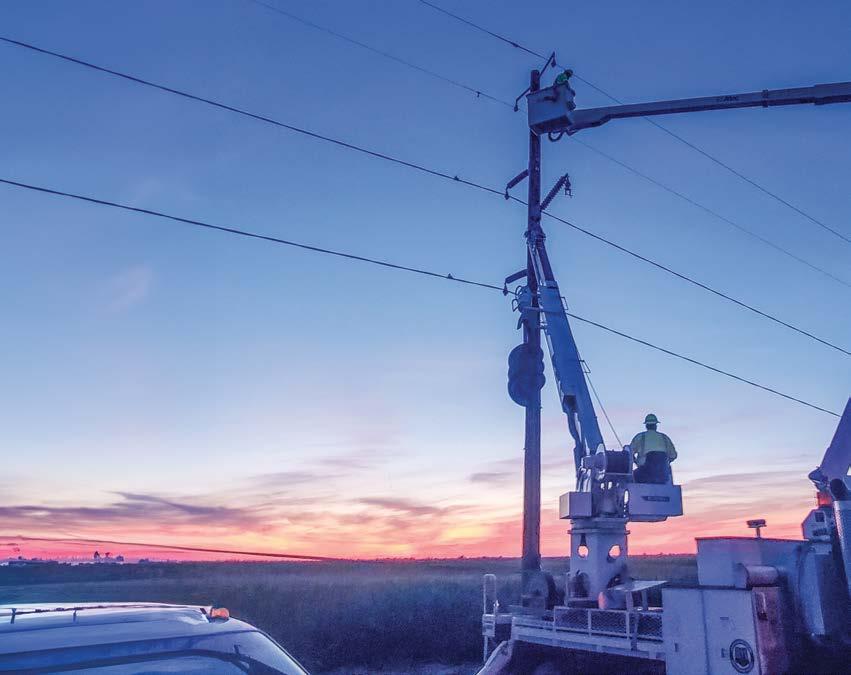










by Scott Flood
When lineworkers are perched in a bucket truck, repairing power lines along a busy road, they have good reason to be concerned about their safety. However, most are less apprehensive about problems like working with high voltages or falling. Their biggest worry is also the most unpredictable: a distracted driver slamming into their vehicle or a nearby power pole.
The National Safety Council reported that 891 people were killed and 37,701 people were injured in work zone crashes during 2022 (the most recent statistics). Most of those crashes occur in construction sites, which are usually well-marked. Electric co-op crews are likely to face even greater danger, as they are often working alone along remote stretches of roads, frequently in heavy rain or other adverse weather conditions that can reduce their visibility.

The danger of work zone crashes led every state to adopt “move over” laws that require drivers to lower their speed and switch lanes when possible to protect emergency vehicles. The goal is to provide an added safety bu er and minimize the potential for accidents. Drivers caught violating the laws can face penalties, such as significant fines.
Additionally, many of the tasks performed by lineworkers, such as reconnecting high-voltage power lines, are inherently dangerous and require their complete focus. When their attention is distracted by speeding or noisy vehicles, they’re more likely to make mistakes that can complicate the repair or cause injury.
Compounding this issue is the dramatic increase in distracted driving. The National Transportation Highway Safety Administration has reported that as many as 1,000 Americans are injured each day because of activities that take drivers’ attention away from the road. The most common is reading and responding to text messages. If a driver traveling at 55 miles per hour glances at their phone for just five seconds, they’ll have traveled the length of a football field before returning their gaze to the road.




Besides the potential for lineworker injuries, roadside accidents can also damage or destroy expensive service vehicles, reducing a co-op’s ability to respond to outages and other problems.



The design of today’s vehicles contributes to distraction. Many vehicles have complex controls for entertainment and climate that demand the driver take their eyes o the road to make even simple adjustments.
Geography can also be a factor. Co-ops serving rural and remote areas often have power lines along twisty and hilly roads. Locals accustomed to driving those roads at fairly high speeds may be startled and have little time to react when they encounter a work crew past a hill or around a curve.
Besides the potential for lineworker injuries, accidents can also damage or destroy expensive service vehicles, reducing a co-op’s ability to respond to outages and other problems. Power poles and other infrastructure may also su er severe damage.
Additionally, many of the tasks performed by lineworkers, such as reconnecting high-voltage power lines, are inherently dangerous and require their complete focus. When their attention is distracted by speeding or noisy vehicles, they’re more likely to make mistakes that can complicate the repair or cause injury.
Nor are co-op employees at risk only when their vehicles are parked and repairs are underway. Lineworkers frequently have to drive slowly along the shoulder of roads to pinpoint broken power lines or failed transformers, especially in darkness or conditions that interfere with visibility.
Many state transportation agencies have work zone awareness programs. Amplifying those e orts by devoting part of a co-op’s advertising, publicity, and social media reminds co-op members and other drivers of the importance of giving lineworkers a wide berth.
Co-ops are considering ways they can modify bucket trucks and other service vehicles to make them more visible. Bright colors and additional lighting such as flashing strobe lights and lighted detour arrows can attract attention from a distance. Reflective “work zone ahead” signs can also alert drivers to be ready for an unusual situation. Sometimes, a little bit of extra attention is all that’s needed to prevent a serious incident.
For more than four decades, business writer Scott Flood has worked with electric cooperatives to build knowledge of energy-related issues among directors, sta and members.





Mississippi’s “Move Over” law was passed to safeguard law enforcement, fire, highway construction workers, and utility crews and vehicles.
According to the law, motorists passing a utility vehicle must slow down and yield the right-of-way by changing lanes, keeping at least one empty lane where possible. If a lane change is impossible, a driver must slow down and be prepared to stop.
Violators may be fined up to $250 for failing to comply and up to $1,000 if there is damage to the o cial vehicle or injury to any driver or passenger of an o cial vehicle.

Co-ops serving rural and remote areas often have power lines along twisty roads. Locals accustomed to driving those roads at fairly high speeds may be startled and have little time to react when they encounter a work crew around a curve.









by

What does “beat the peak” mean, and why should I care about it?



When your cooperative talks about “beat the peak,” it is a call to action for energy consumers to reduce electricity use during periods of highest demand. Using less energy during peak times can ease the strain on the electric grid, benefit your co-op, and sometimes lower your electric bill.
Electricity generation and energy supply must match consumption in real time to ensure safe, reliable power. Every moment of every day, an entire workforce monitors energy use, adjusting power plant production up or down as needed to keep the grid balanced.
As energy demand grows, all of us can do our part to use less. To put this in perspective, peak electricity demand is expected to increase by 38 gigawatts over the next four years, according to the Energy Information Administration. That’s like adding another California to our nation’s power grid.

Peak time varies for each electric utility but typically occurs in the morning when people get ready for the day and in the evening when they return home from work and school. During these times, we turn on lights, cook, adjust the thermostat, run the dishwasher, and do laundry — to name just a few energy-consuming activities.
Typically, the price of power increases when demand is higher. Reducing your electric use during peak times can help lower market prices for everyone and lessen stress on the electric grid.
Electric cooperatives set electric rates to cover costs. Some utilities have time-ofuse rates that reflect higher costs during peak demand periods. Whether you have time-of-use rates or not, these tips can help keep costs down for your utility and establish o -peak energy habits.
As a general rule, I try to spread out my use of equipment and appliances. For example, I avoid washing dishes and clothes, and cooking all at the same time. Running a lot of hot water will cause your water heater to use more energy, too.
Increasing the energy e ciency of your home can lower its impact on the grid. Weatherize windows and doors and add insulation to improve the comfort of your home. You can also consider upgrading to energy e cient appliances or using energy-saving features on your existing appliances.
If you haven’t already, switch your incandescent lighting to LEDs, which use at least 75% less electricity and last up to 25 times longer, according to the U.S. Department of Energy. There are many a ordable options on the market.
Schedule your dishwasher run time. My dishwasher, which is several years old, has a “delay start” button. This is also handy if your dishwasher is loud. Setting it to start after you go to bed shifts that energy consumption to o -peak hours, and you don’t have to hear it.

Still haven’t made the switch to LED lighting? You could be using at least 75% less electricity with LED bulbs.
Running your washing machine and dryer during o -peak hours can help, too. If you’re in the market for a new washer or dryer, look for a model with a high Integrated Modified Energy Factor and a low Integrated Water Factor to save water and energy.
Also, consider switching your charging habits for all devices to opeak hours. If you have an electric vehicle, use the scheduled charge settings. You’ll plug in your vehicle when you get home, and it will start charging automatically during the o -peak hours you choose.
Small changes at home can make a big di erence to the energy grid. Incorporate these energy-wise habits into your daily routine.
Miranda Boutelle is the chief operating o cer at E ciency Services Group in Oregon, a cooperatively owned energy e ciency company.
When we think of kings and music in Mississippi, we often conjure images of Tupelo’s favorite son.
Elvis Presley was indeed the “King of Rock and Roll.”
But the world would not have had an Elvis Presley — or rock and roll for that matter — without the blues. Ground zero for this distinctly American artform was Mississippi. It’s impossible to have a conversation about Mississippi blues without talking about B.B. King.
Had he lived long enough, King would have turned 100 this year.
A decade ago this month, King, 89, died following years of health struggles with diabetes.
Although he was born in Berclair and spent his earliest years near Itta Bena, King considered Indianola his hometown. It was in Indianola where his body laid in state for mourners to pay their last respects back in 2015. Indianola is also home to the B.B. King Museum and Delta Interpretive Center, where blues and King fans from all


over the world visit to learn about where King came from, what he went through, and how he impacted the world with his mesmerizing singing and guitar playing.
For this month’s issue, we visited the museum; a beautiful tribute to a legendary life dedicated to one of this country’s truest and purest creative mediums.
But why should we let blues tourists and King fans from the UK, France, and Belgium have all the fun?
As Mississippians, we should visit to learn about King, Mississippi, the blues, and — in some ways — ourselves.
We hope you enjoy the issue.

by Michael Callahan

Earth’s Bounty + First Saturday The MAX • May 3
Bud N’ Boilin’ Singing Brakeman Park May 3

Meridian Symphony Beethoven & Blue Jeans MSU Riley Center • May 3
Jimmie Rodgers Music Festival Downtown Meridian • May 12–18
Dailey & Vincent MSU Riley Center May 22 Thank You Please Come Again: How Gas Stations Feed & Fuel the American South Exhibit at The MAX On display through June 21




















Download a free, interactive legislative app for Mississippi
Look for “ECM Legislative Roster” in the Apple App Store. An Android version is also available through the Google Play Store.





The Electric Cooperatives of Mississippi o ers an easy-to-use mobile app, which provides information on Mississippi’s state and federal elected o cials.







